- Free AI Essay Writer
- AI Outline Generator
- AI Paragraph Generator
- Paragraph Expander
- Essay Expander
- Literature Review Generator
- Research Paper Generator
- Thesis Generator
- Paraphrasing tool
- AI Rewording Tool
- AI Sentence Rewriter
- AI Rephraser
- AI Paragraph Rewriter
- Summarizing Tool
- AI Content Shortener
- Plagiarism Checker
- AI Detector
- AI Essay Checker
- Citation Generator
- Reference Finder
- Book Citation Generator
- Legal Citation Generator
- Journal Citation Generator
- Reference Citation Generator
- Scientific Citation Generator
- Source Citation Generator
- Website Citation Generator
- URL Citation Generator
- AI Writing Guides
- AI Detection Guides
- Citation Guides
- Grammar Guides
- Paraphrasing Guides
- Plagiarism Guides
- Summary Writing Guides
- STEM Guides
- Humanities Guides
- Language Learning Guides
- Coding Guides
- Top Lists and Recommendations
- AI Detectors
- AI Writing Services
- Coding Homework Help
- Citation Generators
- Essay Writing Websites
- Language Learning Websites
- Math Solvers
- Paraphrasers
- Plagiarism Checkers
- Reference Finders
- Spell Checkers
- Summarizers
- Tutoring Websites

Reflective Essay Examples and Samples
Reflecting on a chosen topic requires deep insight, making reflective essays difficult to write. Read our samples of reflective essays to gain a greater understanding of how to write one on your own.
Introduction to Reflective Essay: An Exploration of Self
A reflective essay is a type of personal writing that allows you to explore and document your thoughts, feelings, and insights about a particular subject or experience. Unlike other forms of academic writing, a reflective essay is more subjective and focuses more on your personal perspectives and interpretations. Writing a reflective essay can be a powerful way to articulate your growth and discoveries, making it an essential tool for creative and personal writing.
The Importance of Personal Experiences in Reflective Writing
Reflective writing revolves around personal experiences. It’s through such experiences that we learn, grow, and evolve. As such, personal experience plays a crucial role in reflective essays. A well-written reflective essay should vividly describe the experience, delve into the feelings it evoked, and critically analyze the impact it had on you. Reflective essays are not just a recounting of events, but a deep exploration of how those events influenced your outlook on life, reshaped your beliefs, or contributed to your personal growth.
Creative Expression: The Heart of a Reflective Essay
Creative writing goes hand in hand with reflective essays. The very nature of reflective essays – introspective, personal, and subjective – calls for creative expression. The creative door is wide open when writing a reflective essay, allowing you to experiment with different writing styles, narrative structures, and descriptive techniques. The goal here is to create an engaging and compelling narrative that captures your personal insights and emotional journey in the most authentic way possible.
Examining Growth Through Reflective Essays: A Journey of Self-Discovery
Reflective essays often serve as a mirror, reflecting your journey of growth. Whether it’s overcoming a personal challenge, learning a new skill, or undergoing a transformative life experience, these growth narratives form the backbone of reflective essays. When writing a reflective essay, it’s essential to not only describe the event or experience but also to delve into how it contributed to your growth as a person. How did it change you? What did you learn about yourself? How have you evolved as a result? Answering these questions can lead to profound insights and self-discovery.
Using Books and Literature as a Catalyst for Reflection
Books and literature often serve as a catalyst for reflection. A classic novel, a thought-provoking non-fiction book, or a compelling piece of poetry can provoke deep reflection and become the subject of a reflective essay. Whether it’s a book that changed your perspective, a character you deeply resonated with, or a theme that made you rethink your beliefs, reflective essays about literature can be a powerful way to explore your thoughts, feelings, and reactions to the written word.
Emotional Intelligence: Exploring Your Emotions in a Reflective Essay
Exploring your emotions forms an essential part of the reflective writing process. In fact, reflecting on our feelings and emotions is an exercise in emotional intelligence. A reflective essay offers a safe space to navigate complex emotions, understand emotional responses, and articulate emotional growth. Whether reflecting on a life-changing event or exploring your reactions to a particular book, it’s crucial to delve into your emotional journey. By understanding your feelings, you can gain deeper insights into your emotional patterns, personal triggers, and coping mechanisms.
- Understanding Emotional Responses: When writing a reflective essay, it’s crucial to delve deep into the emotions experienced during a particular event or circumstance. This could range from joy and excitement to confusion, disappointment, or even grief.
- Navigating Complex Emotions: Sometimes, experiences can elicit complex emotions that are hard to navigate. Reflective writing offers a safe space to untangle these emotions and gain a clearer understanding of your emotional state.
- Articulating Emotional Growth: A reflective essay allows you to document your emotional growth. Overcoming a difficult situation, managing negative emotions, or discovering a new perspective all signify emotional growth that can be articulated through reflective writing.
- Identifying Emotional Patterns: By consistently writing reflective essays, you can identify patterns in your emotional responses. This can help you better understand your reactions to similar situations in the future.
- Recognizing Personal Triggers: Reflective writing can help you identify personal triggers that prompt specific emotional responses. This awareness can equip you to manage these triggers more effectively.
- Developing Coping Mechanisms: Understanding your emotions through reflective writing can lead to the development of effective coping mechanisms. Whether it’s mindfulness, meditation, or simply taking a walk, recognizing what helps you manage your emotions is a significant step towards emotional intelligence.
Reflecting on College Class Experiences
College classes offer rich experiences that can provide plenty of material for a reflective essay. Perhaps it’s a creative writing class that opened up a new world of expression for you, or a challenging science class that pushed you to your limits. Reflecting on these experiences can help you understand your academic journey, recognize your learning style, and appreciate the knowledge you’ve gained. Discuss the skills you’ve acquired, the challenges you’ve faced, the friendships you’ve made, and how these experiences have contributed to your growth and development.
Time Management Reflections: Overcoming Procrastination
Reflecting on time management can lead to valuable insights about your work habits and productivity. Have you struggled with procrastination? Have you discovered effective time management skills? A reflective essay on this topic can discuss your past struggles, the strategies you’ve employed to overcome them, and the progress you’ve made. By examining your relationship with time, you can uncover patterns, identify areas for improvement, and devise strategies to enhance your productivity.
Reflective Essay Examples: Lessons and Insights
One of the best ways to understand reflective essays is by reading and analyzing examples. These examples can serve as a guide, offering insights into the structure, tone, and style of reflective writing. Whether it’s an essay reflecting on personal growth, a transformative travel experience, or a powerful book that left an impression, reflective essay examples can provide inspiration for your own writing. Using a paraphraser can also help you rephrase and improve your writing, ensuring your reflections are expressed clearly and effectively.
In conclusion, reflective essays are a powerful form of personal and creative writing. They allow you to explore your experiences, emotions, and growth in a deeply personal way. Through reflective writing, you can gain valuable insights about yourself and your journey, making it a rewarding and transformative process.
Latin American Women in Politics Essay Sample, Example
Latin American women Latin American women have faced significant challenges in the political arena throughout history. Despite the progress made in recent years, women still…
Combating Money laundering in the UAE Essay Sample, Example
Money laundering Money laundering is a global problem that poses a significant threat to countries’ financial systems. The United Arab Emirates (UAE) is no exception…
Personal Model of Leadership Essay Sample, Example
Leadership is a complex concept that has been studied and debated for centuries. While there is no one-size-fits-all approach to leadership, it is important for…
Things that make me happy Essay Sample, Example
Essay Sample Happiness is a subjective feeling that varies from person to person. What makes one person happy might not necessarily make another person happy.…
One year action plan with SMART Goals Essay Sample, Example
As the world evolves, so do our goals and aspirations. The best way to achieve any objective is by setting a plan that is Specific,…
Ideal Social Moral Code Essay Sample, Example
Upon reflection of the ideal social moral code, within one sentence, it would be: be constructive, not destructive. We have many holy books, manuals on…
Honesty Essay Sample, Example
Honesty is a principle that countless people value. In friendships, marriages, work relationships, and more, honesty is regarded as a prime ethical rule. However, there…
My Earliest Memory Essay Sample, Example
Recalling one’s earliest memories is no joke. We are not computers and knowing the exact sequence of one’s memories is no small task—in fact, I…
Urban Legends and Their Relation to Ancient Myths Essay Sample, Example
Myths have always been a perfect way for people to explain phenomena they could not understand. The unknown is always more frightening than something you…
Why Popular Motivation Techniques are Ineffective Essay Sample, Example
The times when employers needed to force workers to do their jobs have long gone. Compared to how things used to be around a century…
Travel Essay Sample, Example
To travel or not to travel? This is a common question many people ask. It is a pertinent inquiry, as salaried workers often do not…
Top 3 Hollywood Horror Movie Remakes That Are Worse Than Japanese Originals Essay Sample, Example
There is a joking rule that a remake is usually worse than the original movie. There are exceptions to this rule, of course. For example,…
Healthy Life Essay Sample, Example
Leading a healthy life entails many factors: the food we eat, the amount of exercise we get, our personal relationships, our physical well-being, our psychological…
Foreign Language Essay Sample, Example
Learning a language is not a joke, especially a second or third one. I have had a rocky relationship with learning languages, starting from my…
Motivation Essay Sample, Example
People are motivated to do activities by many different factors. Each person is prompted by various influences to complete what they dream of fulfilling. For…
Part-time Jobs Essay Sample, Example
My first job, and the first jobs of countless people, was a part-time position. I think this is partly because full-time jobs are more difficult…
Money Essay Sample, Example
JOIN OUR LEARNING HUB ✅ AI Essay Writer ✅ AI Detector ✅ Plagchecker ✅ Paraphraser ✅ Summarizer ✅ Citation GeneratorGet Free Tools By Johannes Helmold Money…
The Ideal Person Essay Sample, Example
JOIN OUR LEARNING HUB ✅ AI Essay Writer ✅ AI Detector ✅ Plagchecker ✅ Paraphraser ✅ Summarizer ✅ Citation GeneratorGet Free Tools By Johannes Helmold Each…
Famous Essay Sample, Example
By Johannes Helmold JOIN OUR LEARNING HUB ✅ AI Essay Writer ✅ AI Detector ✅ Plagchecker ✅ Paraphraser ✅ Summarizer ✅ Citation GeneratorGet Free Tools I…
Why I Still Use Facebook Essay Sample, Example
By Johannes Helmold JOIN OUR LEARNING HUB ✅ AI Essay Writer ✅ AI Detector ✅ Plagchecker ✅ Paraphraser ✅ Summarizer ✅ Citation GeneratorGet Free Tools It…
Remember Me
What is your profession ? Student Teacher Writer Other
Forgotten Password?
Username or Email
How to Write a Reflective Essay: Easy Guide with Pro Tips

Defining What is a Reflective Essay: Purpose + Importance
Being present is a cornerstone of mindfulness and meditation. You must have often heard that staying in the moment helps you appreciate your surroundings, connects you with people and nature, and allows you to feel whatever emotions you must feel without anxiety. While this is helpful advice as you become more focused and avoid getting lost in thought, how can you truly appreciate the present without reflecting on your past experiences that have led you to the current moment?
We don't say that you should dwell on the past and get carried away with a constant thought process, but hey, hear us out - practice reflective thinking! Think back on your previous life events, paint a true picture of history, and make connections to your present self. This requires you to get a bit analytical and creative. So you might as well document your critical reflection on a piece of paper and give direction to your personal observations. That's when the need for reflective essays steps in!
In a reflective essay, you open up about your thoughts and emotions to uncover your mindset, personality, traits of character, and background. Your reflective essay should include a description of the experience/literature piece as well as explanations of your thoughts, feelings, and reactions. In this article, our essay writer service will share our ultimate guide on how to write a reflective essay with a clear format and reflective essay examples that will inspire you.
How to Write a Reflective Essay with a Proper Reflective Essay Outline
To give you a clear idea of structuring a reflective essay template, we broke down the essential steps below. Primarily, the organization of a reflective essay is very similar to other types of papers. However, our custom writers got more specific with the reflective essay outline to ease your writing process.
Reflective Essay Introduction
When wondering how to start a reflective essay, it is no surprise that you should begin writing your paper with an introductory paragraph. So, what's new and different with the reflection essay introduction? Let's dissect:
- Open your intro with an attention-seizing hook that engages your audience into reflective thinking with you. It can be something like: 'As I was sitting on my bed with my notebook placed on my shaky lap waiting for the letter of acceptance, I could not help but reflect, was enrolling in college the path I wanted to take in the future?'
- Provide context with a quick overview of the reflective essay topic. Don't reveal too much information at the start to prevent your audience from becoming discouraged to continue reading.
- Make a claim with a strong reflective essay thesis statement. It should be a simple explanation of the essay's main point, in this example, a specific event that had a big impact on you.
Reflective Essay Body Paragraphs
The next step is to develop the body of your essay. This section of the paper may be the most challenging because it's simple to ramble and replicate yourself both in the outline and the actual writing. Planning the body properly requires a lot of time and work, and the following advice can assist you in doing this effectively:
- Consider using a sequential strategy. This entails reviewing everything you wish to discuss in the order it occurred. This method ensures that your work is structured and cohesive.
- Make sure the body paragraph is well-rounded and employs the right amount of analysis. The body should go into the effects of the event on your life and the insights you've gained as a consequence.
- Prioritize reflecting rather than summarizing your points. In addition to giving readers insight into your personal experience, a reflective stance will also show off your personality and demonstrate your ability to handle certain challenges.
Reflective Essay Conclusion
The goal of your reflective essay conclusion should be to tie everything together by summarizing the key ideas raised throughout, as well as the lessons you were able to take away from experience.
- Don't forget to include the reasons for and the methods used to improve your beliefs and actions. Think about how your personality and skills have changed as well.
- What conclusions can you draw about your behavior in particular circumstances? What could you do differently if the conditions were the same in the future?
Remember that your instructor will be searching for clear signs of reflection.
Understanding a Reflection Paper Format
The format of reflective essay greatly differs from an argumentative or research paper. A reflective essay is more of a well-structured story or a diary entry rife with insight and reflection. You might be required to arrange your essay using the APA style or the MLA format.
And the typical reflection paper length varies between 300 and 700 words, but ask your instructor about the word length if it was assigned to you. Even though this essay is about you, try to avoid too much informal language.
If your instructor asks you to use an APA or MLA style format for reflective essay, here are a few shortcuts:
Reflective Essay in MLA Format
- Times New Roman 12pt font double spaced;
- 1" margins;
- The top right includes the last name and page number on every page;
- Titles are centered;
- The header should include your name, your professor's name, course number, and the date (dd/mm/yy);
- The last page includes a Works Cited.
Reflective Essay in APA Style
- Include a page header on the top of every page;
- Insert page number on the right;
- Your reflective essay should be divided into four parts: Title Page, Abstract, Main Body, and References.
Reflective Essay Writing Tips
You may think we've armed you with enough tips and pointers for reflective writing, but it doesn't stop here. Below we gathered some expert-approved tips for constructing uncontested reflection papers.

- Be as detailed as possible while writing. To make your reflective essay writing come to life, you should employ several tactics such as symbolism, sentence patterns, etc.
- Keep your audience in mind. The reader will become frustrated if you continue writing in the first person without taking a moment to convey something more important, even though you will likely speak about something from your own perspective.
- Put forth the effort to allow the reader to feel the situation or emotion you are attempting to explain.
- Don't preach; demonstrate. Instead of just reporting what happened, use description appropriately to paint a clear picture of the event or sensation.
- Plan the wording and structure of your reflective essay around a central emotion or subject, such as joy, pleasure, fear, or grief.
- Avoid adding dull elements that can lessen the effect of your work. Why include it if it won't enhance the emotion or understanding you wish to convey?
- There must be a constant sense of progression. Consider whether the event has transformed you or others around you.
- Remember to double-check your grammar, syntax, and spelling.
Ready to Shine a Light on Your Innermost Thoughts?
Order your reflection essays now and let a wider audience hear your unique story
Reflective Essay Topic Ideas
As a reflective essay should be about your own views and experiences, you generally can't use someone else's ideas. But to help you get started, here are some suggestions for writing topics:
- An experience you will never forget.
- The moment you overcame a fear.
- The most difficult choice you had to make.
- A time your beliefs were challenged.
- A time something changed your life.
- The happiest or most frightening moment of your life so far.
- Ways you think you or people can make the world a better place.
- A time you felt lost.
- An introspective look at your choices or a time you made the wrong choice.
- A moment in your life you would like to relive.
You may find it convenient to create a chart or table to keep track of your ideas. Split your chart into three parts:

- In the first column, write key experiences or your main points. You can arrange them from most important to least important.
- In the second column, list your response to the points you stated in the first column.
- In the third column, write what, from your response, you would like to share in the essay.
Meanwhile, if you're about to enroll in your dream university and your mind is constantly occupied with - 'how to write my college admissions essay?', order an academic essay on our platform to free you of unnecessary anxiety.
Reflective Essay Sample
Referring to reflective essay examples can help you a lot. A reflective essay sample can provide you with useful insight into how your essay should look like. You can also buy an essay online if you need one customized to your specific requirements.
How to Conclude a Reflective Essay
As we come to an end, it's only logical to reflect on the main points discussed above in the article. By now, you should clearly understand what is a reflective essay and that the key to writing a reflective essay is demonstrating what lessons you have taken away from your experiences and why and how these lessons have shaped you. It should also have a clear reflective essay format, with an opening, development of ideas, and resolution.
Now that you have the tools to create a thorough and accurate reflective paper, you might want to hand over other tasks like writing definition essay examples to our experienced writers. In this case, feel free to buy an essay online on our platform and reflect on your past events without worrying about future assignments!
Want to Easily Impress Your Professors?
Count on the support of our professional writers for a top-notch academic paper
Related Articles
%20(1).webp)
- Directories
Reflective essays
Reflective essays are academic essays; what makes an essay "good" will work for a reflective essay. What is different about a reflective essay is that the essay is about you and your thinking. However, you will need evidence from your course to back up your reflections.
You should structure a reflective essay as an essay, that is write to persuade your reader of your key reflections (or argument). The diagram above, details how to stucture your reflections through the essay. To find out more see the section on essay writing .
Business example
The following example comes from business. Thanks to Dr Colleen Hayes for the three samples.
Students were asked to write a reflective essay on their learning in the course by responding to the following question:
What key thing have you learned about corporate social responsibility in the course?
Example 1: Retelling
This writing is (1) descriptive/listing of content, not reflective and (2) not properly referenced (the definition of stakeholders is directly copied from Freeman in the lecture slides.
Example 2: Relating
This writing involves relating to personal experience and has some integration of course concepts (stakeholders).
Example 3: Reflecting
More reflective (forward-looking), better citation and integration of multiple course concepts, and reflection that links with personal experience.
An anthropology marking rubric
For this assessment, students were required to write a 1500-1800 word essay building on the themes of the course to address the question "We are all pirates". Attached under reference documents is the rubric used to mark the essay (thanks to Dr Caroline Schuster). Notice that it requires both the reflection (reflect, relate and retell) as well as the poor traditional requirements of an essay (Writing and organisation, Supporting claims with scholarly sources).
Reflective writing
Learning journals
Reference Documents
- Sample rubric from Anthropology (PDF, 243.24 KB)
Use contact details to request an alternative file format.
- ANU Library Academic Skills
- +61 2 6125 2972

Reflective Essay: Introduction, Structure, Topics, Examples For University
Table of Contents
If you’re not quite sure how to go about writing reflective essays, they can be a real stumbling block. Reflective essays are essentially a critical examination of a life experience, and with the right guidance, they don’t have to be too difficult to write. As with other essays, a reflective essay needs to be well structured and easily understood, but its content is more like a diary entry.
This guide discusses how to write a successful reflective essay, including what makes a great structure and some tips on the writing process. To make this guide the ultimate guide for anyone who needs help with reflective essays, we’ve included an example reflective essay as well.
Reflective Essay
Reflective essays require students to examine their life experiences, especially those which left an impact.

The purpose of writing a reflective essay is to challenge students to think deeply and to learn from their experiences. This is done by describing their thoughts and feelings regarding a certain experience and analyzing its impact.
Reflective essays are a unique form of academic writing that encourages introspection and self-analysis. They provide an opportunity for individuals to reflect upon their experiences, thoughts, and emotions, and effectively communicate their insights. In this article, we will explore the essential components of a reflective essay, discuss popular topics, provide guidance on how to start and structure the essay, and offer examples to inspire your writing.
I. Understanding Reflective Essays:
- Definition and purpose of reflective essays
- Key characteristics that distinguish them from other types of essays
- Benefits of writing reflective essays for personal growth and development
II. Choosing a Reflective Essay Topic:
- Exploring personal experiences and their impact
- Analyzing significant life events or milestones
- Examining challenges, successes, or failures and lessons learned
- Reflecting on personal growth and transformation
- Discussing the impact of specific books, movies, or artworks
- Analyzing the influence of cultural or social experiences
- Reflecting on internships, volunteer work, or professional experiences
III. Starting a Reflective Essay:
- Engage the reader with a captivating hook or anecdote
- Introduce the topic and provide context
- Clearly state the purpose and objectives of the reflection
- Include a thesis statement that highlights the main insights to be discussed
IV. Writing a Reflective Essay on a Class:
- Assessing the overall learning experience and objectives of the class
- Analyzing personal growth and development throughout the course
- Reflecting on challenges, achievements, and lessons learned
- Discussing the impact of specific assignments, projects, or discussions
- Evaluating the effectiveness of teaching methods and materials
V. Common Mistakes to Avoid in Reflective Essay Writing:
- Superficial reflection without deep analysis
- Overuse of personal opinions without supporting evidence
- Lack of organization and coherence in presenting ideas
- Neglecting to connect personal experiences to broader concepts or theories
- Failing to provide specific examples to illustrate key points
VI. Why “Shooting an Elephant” by George Orwell is Classified as a Reflective Essay:
- Briefly summarize the essay’s content and context
- Analyze the introspective and self-analytical elements in Orwell’s narrative
- Discuss the themes of moral conflict, imperialism, and personal conscience
- Highlight Orwell’s reflections on the psychological and emotional impact of his actions
VII. Reflective Essay Structure:
- Engaging opening statement or anecdote
- Background information and context
- Clear thesis statement
- Present and analyze personal experiences, thoughts, and emotions
- Reflect on the significance and impact of those experiences
- Connect personal reflections to broader concepts or theories
- Provide supporting evidence and specific examples
- Summarize key insights and reflections
- Emphasize the personal growth or lessons learned
- Conclude with a thought-provoking statement or call to action
VIII. Reflective Essay Examples:
- Example 1: Reflecting on a life-changing travel experience
- Example 2: Analyzing personal growth during a challenging academic year
- Example 3: Reflecting on the impact of volunteering at a local shelter
During a reflective essay, the writer examines his or her own experiences, hence the term ‘reflection’. The purpose of a reflective essay is to allow the author to recount a particular life experience. However, it should also explore how he or she has changed or grown as a result of the experience.
The format of reflective writing can vary, but you’ll most likely see it in the form of a learning log or diary entry. The author’s diary entries demonstrate how the author’s thoughts have developed and evolved over the course of a particular period of time.
The format of a reflective essay can vary depending on the intended audience. A reflective essay might be academic or part of a broader piece of writing for a magazine, for example.
While the format for class assignments may vary, the purpose generally remains the same: tutors want students to think deeply and critically about a particular learning experience. Here are some examples of reflective essay formats you may need to write:
Focusing on personal growth:
Tutors often use this type of paper to help students develop their ability to analyze their personal life experiences so that they can grow and develop emotionally. As a result of the essay, the student gains a better understanding of themselves and their behaviors.
Taking a closer look at the literature:
The purpose of this type of essay is for students to summarize the literature, after which it is applied to their own experiences.
What am I supposed to write about?
When deciding on the content of your reflective essay, you need to keep in mind that it is highly personal and is intended to engage the reader. Reflective essays are much more than just recounting a story. As you reflect on your experience (more on this later), you will need to demonstrate how it influenced your subsequent behavior and how your life has consequently changed.
Start by thinking about some important experiences in your life that have had a profound impact on you, either positively or negatively. A reflection essay topic could be a real-life experience, an imagined experience, a special object or place, a person who influenced you, or something you’ve seen or read.
If you are asked to write a reflective essay for an academic assignment, it is likely that you will be asked to focus on a particular episode – such as a time when you had to make an influential decision – and explain the results. In a reflective essay, the aftermath of the experience is especially significant; miss this out and you will simply be telling a story.
Is Remote Learning a Genuine Alternative to More Traditional Methods?
Considerations
In this type of essay, the reflective process is at the core, so it’s important that you get it right from the beginning. Think deeply about how the experience you have chosen to focus on impacted or changed you. Consider the implications for you on a personal level based on your memories and feelings.
Once you have chosen the topic of your essay, it is imperative that you spend a lot of time thinking about it and studying it thoroughly. Write down everything you remember about it, describing it as clearly and completely as you can. Use your five senses to describe your experience, and be sure to use adjectives. During this stage, you can simply take notes using short phrases, but make sure to record your reactions, perceptions, and experiences.
As soon as you’ve emptied your memory, you should begin reflecting. Choosing some reflection questions that will help you think deeply about the impact and lasting effects of your experience is a helpful way to do this. Here are some suggestions:
- As a result of the experience, what have you learned about yourself?
- What have you developed as a result? How?
- Has it had a positive or negative impact on your life?
- Looking back, what would you do differently?
- If you could go back, what would you do differently? Did you make the right decisions?
- How would you describe the experience in general? What did you learn from the experience? What skills or perspectives did you acquire?
You can use these signpost questions to kick-start your reflective process. Remember that asking yourself lots of questions is crucial to ensuring that you think deeply and critically about your experiences – a skill at the heart of a great reflective essay.
Use models of reflection (like the Gibbs or Kolb cycles) before, during, and after the learning process to ensure that you maintain a high standard of analysis. Before you get to the nitty-gritty of the process, consider questions such as: what might happen (in regards to the experience)?
Will there be any challenges? What knowledge will be needed to best prepare? When you are planning and writing, these questions may be helpful: what is happening within the learning process? Has everything worked according to plan? How am I handling the challenges that come with it?
Do you need to do anything else to ensure that the learning process is successful? Is there anything I can learn from this? Using a framework like this will enable you to keep track of the reflective process that should guide your work.
Here’s a useful tip: no matter how well prepared you feel with all that time spent reflecting in your arsenal, don’t start writing your essay until you have developed a comprehensive, well-rounded plan. There will be so much more coherence in what you write, your ideas will be expressed with structure and clarity, and your essay will probably receive higher marks as a result.
It’s especially important when writing a reflective essay as it’s possible for people to get a little ‘lost’ or disorganized as they recount their own experiences in an erratic and often unsystematic manner since it’s an incredibly personal topic. But if you outline thoroughly (this is the same thing as a ‘plan’) and adhere to it like Christopher Columbus adhered to a map, you should be fine as you embark on the ultimate step of writing your essay. We’ve summarized the benefits of creating a detailed essay outline below if you’re still not convinced of the value of planning:
An outline can help you identify all the details you plan to include in your essay, allowing you to remove all superfluous details so that your essay is concise and to the point.
Think of the outline as a map – you plan in advance which points you will navigate through and discuss in your writing. You will more likely have a clear line of thought, making your work easier to understand. You’ll be less likely to miss out on any pertinent details, and you won’t have to go back at the end and try to fit them in.
This is a real-time-saver! When you use the outline as an essay’s skeleton, you’ll save a tremendous amount of time when writing because you’ll know exactly what you want to say. Due to this, you will be able to devote more time to editing the paper and ensuring it meets high standards.
As you now know the advantages of using an outline for your reflective essay, it is important that you know how to create one. There can be significant differences between it and other typical essay outlines, mostly due to the varying topics. As always, you need to begin your outline by drafting the introduction, body, and conclusion. We will discuss this in more detail below.
Introduction
Your reflective essay must begin with an introduction that contains both a hook and a thesis statement. The goal of a ‘hook’ is to capture the attention of your audience or reader from the very beginning. In the first paragraph of your story, you should convey the exciting aspects of your story so that you can succeed in
If you think about the opening quote of this article, did it grab your attention and make you want to read more? This thesis statement summarizes the essay’s focus, which in this case is a particular experience that left a lasting impression on you. Give a quick overview of your experience – don’t give too much information away or you’ll lose readers’ interest.
Education Essay Can Come from Both a Brilliant and Mediocre Writer
Reflection Essay Structure
A reflective essay differs greatly from an argumentative or research paper in its format. Reflective essays are more like well-structured stories or diary entries that are rife with insights and reflections. Your essay may need to be formatted according to the APA style or MLA style.
In general, the length of a reflection paper varies between 300 and 700 words, but it is a good idea to check with your instructor or employer about the word count. Even though this is an essay about you, you should try to avoid using too much informal language.
The following shortcuts can help you format your paper according to APA or MLA style if your instructor asks:
MLA Format for Reflective Essay
- Times New Roman 12 pt font double spaced;
- 1” margins;
- The top right includes the last name and page number on every page;
- Titles are centered;
- The header should include your name, your professor’s name, course number, and the date (dd/mm/yy);
- The last page contains a Works Cited list.
Reflective Essay in APA Style
- Include a page header on the top of every page;
- Insert page number on the right;
- Your reflective essay should be divided into four parts: Title Page, Abstract, Main Body, and References.
Reflective Essay Outline
Look at your brainstorming table to start organizing your reflective essay. ‘Past experience’ and ‘description’ should make up less than 10% of your essay.
You should include the following in your introduction:
- Grab the reader’s attention with a short preview of what you’ll be writing about.
Example: We found Buffy head-to-toe covered in tar, starved and fur in patches, under an abandoned garbage truck.
- It is important to include ‘past experiences’ in a reflective essay thesis statement; a brief description of what the essay is about.
Example: My summer volunteering experience at the animal shelter inspired me to pursue this type of work in the future.
Chronological events are the best way to explain the structure of body paragraphs. Respond to the bold questions in the ‘reflection’ section of the table to create a linear storyline.
Here’s an example of what the body paragraph outline should look like:
- Explicit expectations about the shelter
Example: I thought it was going to be boring and mundane.
- The first impression
- Experience at the shelter
Example: Finding and rescuing Buffy.
- Other experiences with rescuing animals
- Discoveries
Example: Newly found passion and feelings toward the work.
- A newly developed mindset
Example: How your thoughts about animal treatment have changed.
Tips on How to Stay Productive While Working Remotely
Here’s How You Can Submit a Well-Written Reflective Essay for University
Even though writing a reflective essay may seem difficult at first, once you have a clear idea of what you will write and more importantly, how to write, it often gets easier as you go along. Here are five key writing tips to keep in mind when writing a reflective essay.
Choosing a Topic for Reflection
As a busy student, when was the last time you drowned yourself in thoughts and reflected on past experiences? Here is an assignment that intentionally puts you in that position.
Think about all of the experiences which have shaped you – a life-changing event, an interaction with someone you admire, a movie character that appealed to you, a book that gave you perspective, or any other experience which contributed to your character or thought process.
You should choose a topic that will help you reflect on your growth as an individual. Start brainstorming and record every idea that comes to mind.
Organize your thoughts in a mind map
The next step is to create a mind map to help you organize your essay once you have a rough idea of what you want to write.
You can use your mind map to quiz yourself by asking questions of relevance and putting together perspectives for your essay.
The purpose of this exercise is to give you an idea of what you want your essay to be about. It is important to keep pushing yourself to think more deeply and find meaning in your experiences in order to create a successful reflective essay.
From becoming a Writer Today, here are some tips on using mind maps to write better and faster
Start Freewriting
Sometimes, all you have to do is start writing. Essentially, that’s what freewriting is all about.
After brainstorming, creating a mind map, and organizing your thoughts, open a blank document and start writing. Do not stop to think or to edit – just write as your thoughts come to you.
The best part of freewriting is that it results in a steady flow of ideas you may not have thought of otherwise.
In other words, whether or not you’re motivated to write or are constantly second-guessing your ideas, it helps to let your ideas guide you and put them down on paper.
Structure the Essay
It’s time to put your ideas and thoughts into words and give them a proper structure. A reflective essay should have the following parts:
You should begin your essay with a hook to grab the reader’s attention. While setting the tone for the rest of the essay, your thesis statement should introduce the past experience you will be reflecting on;
In this section, you will elaborate on the experience and its significance, as well as its impact on your life. Avoid rambling on and on about the experience for readers to want to read more of your essay, you need to use your storytelling skills. If you can, use examples to strengthen your narrative;
A summary of your reflections is provided in the concluding paragraph. In your essay, you should describe how the experience shaped your life and how you intend to take your learnings and apply them.
Proofread, Proofread and Proofread
Be sure to proofread your reflective essay before submitting it. Before finalizing it, you need to do thorough proofreading. You will be surprised to see how many silly mistakes are made in the first draft.
Be on the lookout for grammatical, spelling, and sentence formation mistakes. Make sure your essay flows well and avoids plagiarism. If you want a fresh set of eyes on your essay, have a family member or friend read it too.
Reflective Essay Topics
Many students find choosing the right topic for a reflective essay difficult. Writing a reflective essay requires creativity and strong writing skills to express your emotions.
Reflective essays can be inspired by nature, places, relationships, and events. Here are some tips that will help you choose the right essay topic.
- Decide on a topic idea for your reflective essay that you are familiar with. You will find it easier to write an essay about a topic you are interested in. Never choose a topic that is new to you. This makes the writing phase difficult.
- Research your topic: Try to recollect minor details about it. Remember all the things that are related to your topic, and include them in your essay. Take notes about your topic.
- Pick a topic that you can explain from a unique viewpoint: Choose a topic that you can explain from a different perspective. Writing something unique that demonstrates your personality in an interesting way is a good technique. Share a memorable and meaningful experience from your life.
Topics for Reflective Essays for Middle School Students
Essay topics can be difficult to choose for some students. The following list of topics can be classified according to grade level. Pick from them and make topic selection easier.
Topics for Reflective Essays in Grade 7
- Taking a trip
- To go scuba diving
- Within your hometown
- Was something you were proud of
- Even when you were lost
- To your favorite cartoon
- During that time you lied
- When you were hunting
- Did your family play an important role in your life?
- Spending time outdoors
Topics for Reflective Essays in Grade 8
- Running in the outdoors
- While picking berries
- Will be your biggest loss
- Who is your biggest inspiration?
- What is your greatest fear?
- Tell me about your most exciting moment.
- What is your least favorite course?
- When you go on a date
- To a birthday party
- Which is your favorite online space?
Topics for Reflective Essays in Grade 9
- A new school
- Makes me think about the future.
- You participated in or watched a sporting event.
- You moved to a new city.
- You had an unforgettable dream.
- You were running and hunting.
- You cannot forget that dream.
- It was your childhood home.
- Watching the sunrise
- An award ceremony
Topics for Reflective Essays in Grade 10
- Defending someone in a situation
- While playing with friends
- It was a memorable dream
- About lying and hiding
- The most recent meal
- While getting lost in the dark
- As an intern at a hospital
- Or when someone’s life inspired you to change your own
- Challenges as a college freshman
- By participating in sports
Topics for Reflective Essays for College Students
For college students, the most difficult part of writing a reflective essay is choosing a topic. Some students are better at choosing the essay topic than others, but some will get stuck in this phase.
Here are some excellent reflective essay topics for college students for your convenience. Choose one and write a well-written essay.
- First time writing a thesis statement
- Your favorite video game
- The impact of social media on students
- A place you always try to avoid
- What was the best birthday memory you had?
- What is your favorite restaurant?
- The moment when you were proud of yourself
- The bravest moment of your life
- The most beautiful thing you have ever seen
- A time you were embarrassed
Getting Higher Scores for an Essay: Tested Tips from Students
Topics for Reflective Essays for High School Students
The choice of a topic for a reflective essay can be confusing for high school students. Your topic should be engaging and you should be able to explain your personal experience easily. Here is a list of good topics for high school students; choose something from the list for your essay.
- Shop at your favorite outlet store
- To relive your favorite childhood memory
- Of the most memorable holiday
- That scared you?
- That’s when you met your best friend
- And what you love about yourself
- Is playing with friends.
- What’s your favorite book?
- I loved playing in the mud as a kid.
- Having to move to a new town or city
Topics for Reflective Essays about Places
Reflective essays should be based on strong emotions and memories. You could write an essay about a day spent at your favorite café, favorite restaurant, etc.
It is easy to write a reflective essay about a place where you have really good memories. Here are some topic ideas that you can use and write an essay on.
- Your grandparents’ house
- A skating rink
- A place where you feel safe
- A favorite vacation spot
- A popular lunch spot
- On your first day at the circus
- The mall or your favorite store
- Your first trip abroad
- Best park in your town
- Your most memorable adventure
Topics for Reflective Essays about Events
A good way to grab the reader’s attention is to write about any event. Your essay can be about a birthday party, a farewell, or any other event that you have enough information about.
If you are writing a reflective essay about an event, include vivid details. Here are some interesting topics for reflection essays, choose one and write a good essay.
- Unexpected gift
- To travel on vacation
- While you were lost
- The first time you voted
- On your trip to the zoo
- When you got a new job
- It was one of your most memorable trips
- During the holiday season
- When you moved to a new city
- Or when you swam fishing
Topics for Reflective Essays on Nature
A reflective essay should provide the reader with a deeper and more meaningful experience. In addition to making your writing process more interesting, writing about nature also stimulates your imagination.
The following are some good reflective essay topics about nature:
- Mountain climbing
- Ocean diving
- Hiking in the woods
- Climbing rocks
- And watching the sunset
- While running in the forest.
- Spending quality time with your pet.
- Taking a hike in the woods
- And going swimming
- While watching animals at a zoo
How to write a term paper
Topics for reflection on relationships
As relationships are filled with strong emotions, writing a reflective essay about them means expressing those emotions. The following are some good reflective essay topics about relationships:
- A wonderful family reunion
- When you spoke publicly for the first time
- What friendship means to me
- When you were punished by your parents
- During a family reunion
- When you apologized
- For a time you spent with friends without parental supervision
- Tell me about your relationship with a family member
- An angry conversation
- Or a genuinely funny laugh
Some reflective essay topics are the same as some of the questions you may ask in a job interview.
Examples of Reflective Essay
Check out some examples for inspiration now that you know what it takes to write a reflective essay.
An Example of a Reflective Essay on “My Little Brother”
Essay example reflecting on the arrival of a younger sibling, written at a middle or high school level.
“There have been many life-changing experiences in my short life. Every new experience has been the first experience at one point in time. For good or for bad, each event altered the course of my life. But, the most transformative event was the birth of my youngest brother.”.
Joel is someone my parents often refer to as a happy accident. My mother became pregnant when I was 13 and my other brother, Jake, was 10. We were what you would call a well-rounded family of four. In almost every way, we fit the ideal classification. My youngest brother’s striking blue eyes were the moment when we realized what we were missing.
Honestly, I resented having another sibling. It wasn’t necessary to add to our family, and my mother, already 38 at the time, was considered high risk because of her age. A pregnancy full of complications sent my life on a rollercoaster-like ride that my 13-year-old mind could not comprehend. Now I can see how forging through those loops helped me cope with the unforeseen challenges of life.

My mother took me to the hospital instead of my father on the day Joel was born. I was the next best alternative because Jake and my father were both feverish; it wasn’t a planned move. With each contraction, I gained a new appreciation for just how strong and powerful a woman could be at her weakest. Through holding her hand and feeding her ice chips, I gained a connection with my mother that I didn’t realize we lacked.
Almost simultaneously, my new baby brother entered this world. One doesn’t realize how much you need something until it’s sitting in your lap. Secondly, my life after this moment would never be the same the moment he curled his chubby little finger around mine, I understood the meaning of the words “happy accident.”.y.
Life has given me many experiences that have shaped me as a person. But, nothing so profoundly changed my views and outlook on life as the birth of my youngest brother. Joel’s arrival was a life-altering event that caused me to see the world through new eyes.”
Assignment Writing Purposes You Need to Know
Reflective Essay Example for “ Reading My Favorite Book”
This reflective essay example about a favorite book is something you might find at the middle or high school level.
When it comes to books, I don’t understand the appeal. Every time I was given an assignment, I would read one after another, not understanding what all the fuss was about. Nevertheless, the moment I read Pride and Prejudice, it was as if my literary eyes were opened for the first time. It stirred love within me for classics I didn’t realize could exist.
When I was first given the assignment of reading Pride and Prejudice, like many of my friends, I scoffed. With an eye roll, I internally calculated how much time I would have to read the book and write a report. I sighed at the loss of time with my friends for a stupid classic.
Cracking open the cover, I was determined to hate it before even reading the first words. By the time I reached page 3, I nearly stopped reading. But there was something about Elizabeth Bennet that quietly piqued my interest. I can’t say where, but somewhere along the way, my eyes devoured the pages instead of trudging along.
The moment I reached the end, I was ecstatic and disappointed at the same time. Their ending had been perfect, but I realized I would miss them. Not just them, but I would also miss being a part of their world.
It was the first time the characters of a story had affected me this way, so I tried to shake it off. However, after several days, that sadness carried me to the classics section of the school library. The moment I cracked open my next classic, my soul instantly felt more at ease, and I’ve never looked back.
I never thought I’d say a book changed me, but in this case, it’s true. The love I found in Pride and Prejudice introduced me to a beautiful world of classic literature I can’t imagine living without. Despite not reading Pride and Prejudice for a while, it will always be my favorite book.
In the conclusion of your reflective essay, you should focus on bringing your piece together. This will include providing a summary of both the points made throughout and what you have learned as a result. Try to include a few points on why and how your attitudes and behaviors have been changed.
Consider also how your character and skills have been affected, for example: what conclusions can be drawn about your problem-solving skills? What can be concluded about your approach to specific situations? What might you do differently in similar situations in the future? What steps have you taken to consolidate everything that you have learned from your experience?
Keep in mind that your tutor will be looking out for evidence of reflection at a very high standard.
Congratulations – you now have the tools to create a thorough and accurate plan which should put you in good stead for the ultimate phase indeed of any essay, the writing process.
Oxbridge Notes offers a wide array of meticulously crafted study resources tailored for law students, providing invaluable support for academic endeavors. Our platform boasts a comprehensive collection of notes, essays, and revision materials covering a diverse range of legal topics, meticulously curated by top students and academics from esteemed universities. Whether you’re preparing for exams, writing essays, or seeking to deepen your understanding of legal concepts, Oxbridge Notes is your trusted companion on the journey to legal excellence.
How do you start off a reflective essay?
As is the case with all essays, your reflective essay must begin with an introduction that contains both a hook and a thesis statement. The point of having a ‘hook’ is to grab the attention of your audience or reader from the very beginning.
Can you say I in a reflective essay?
In your reflective essay, you should use the first person with terms like I, me, my, and mine. The essay is an account of something that actually happened to you as well as your thoughts on the event.
What is an example of a reflection?
Common examples include the reflection of light, sound, and water waves. The law of reflection says that for specular reflection the angle at which the wave is incident on the surface equals the angle at which it is reflected. Mirrors exhibit specular reflection.
How do you start the first paragraph of a reflective essay?
Describe the subject matter of the paper in more detail. Include one or two sentences after the first sentence in which you describe the basic features of whatever topic you will be discussing in your essay. Describe them in terms of your feelings, and how you felt and experienced whatever you are discussing.
How many paragraphs should a reflective essay have?
The number of paragraphs depends on the requested essay length. However, it is recommended to write at least three paragraphs in this part. In the body, present your main points, arguments, and examples. This is the part of an essay where you express all your main ideas, develop them, and express your feelings and emotions.
What are the three parts of a reflective essay?
However, some major elements go into a typical reflective essay: introduction, body, and conclusion.
How Do You Write A Reflective Essay?
To write a reflective essay, follow these steps:
- Choose a topic: Select a specific event, experience, or concept that you want to reflect upon.
- Brainstorm and outline: Reflect on your chosen topic and jot down key points, thoughts, and emotions associated with it. Create an outline to organize your ideas.
- Introduction: Begin with an engaging hook to grab the reader’s attention. Provide background information and context related to the topic. End the introduction with a clear thesis statement that expresses the main insights or lessons you will discuss.
- Body paragraphs: Each paragraph should focus on a specific aspect or experience related to your topic. Reflect on your thoughts, feelings, and observations, and support them with specific examples or evidence. Analyze the significance and impact of these experiences.
- Use reflection techniques: Incorporate reflection techniques such as asking yourself questions, exploring the “why” behind your thoughts and emotions, and connecting your experiences to broader concepts or theories.
- Conclusion: Summarize your key insights and reflections from the essay. Emphasize personal growth, lessons learned, or changes in perspective. Leave the reader with a thought-provoking statement or a call to action.
Which Of These Best Describes A Reflective Essay?
A reflective essay is best described as a type of academic or personal writing that allows individuals to examine and reflect upon their experiences, thoughts, and emotions. It involves introspection, self-analysis, and the exploration of lessons learned or personal growth. Reflective essays provide a platform for individuals to communicate their insights and understanding of a particular event, concept, or life experience.
What Is A Reflective Essay And Examples?
A reflective essay is a form of writing where individuals express their thoughts, feelings, and observations about a specific experience, event, or topic. It goes beyond simply describing the experience and delves into analyzing the impact, significance, and lessons learned. Reflective essays encourage self-reflection and introspection, allowing writers to gain deeper understanding and insight.
Examples of reflective essay topics include:
- Reflecting on a life-changing travel experience and its impact on personal growth.
- Analyzing the challenges and successes encountered during a group project and the lessons learned.
- Reflecting on the influence of a particular book, film, or artwork and its effect on personal perspectives.
- Examining the role of personal values and beliefs in decision-making processes.
What Are The Parts Of A Typical Reflective Essay?
A typical reflective essay consists of the following parts:
- Introduction: It provides an engaging hook, background information, and context for the topic. The introduction ends with a clear thesis statement that states the main insights or lessons to be discussed.
- Body paragraphs: Each paragraph focuses on a specific aspect or experience related to the topic. Writers reflect on their thoughts, feelings, and observations, supporting them with examples or evidence. They analyze the significance and impact of these experiences and connect them to broader concepts or theories.
- Conclusion: The conclusion summarizes the key insights and reflections from the essay. It emphasizes personal growth, lessons learned, or changes in perspective. A thought-provoking statement or a call to action is often included to leave a lasting impression on the reader.
What Is A Goal Of The Introduction In A Reflective Essay?
The goal of the introduction in a reflective essay is to capture the reader’s attention and provide them with the necessary background information and context related to the topic. It should set the stage for the reflective journey that follows. The introduction concludes with a clear thesis statement that outlines the main insights or lessons the writer will discuss in the essay. It acts as a roadmap, guiding the reader through the writer’s reflections.
What Idea Would Most Likely Make The Best Reflective Essay?
The best idea for a reflective essay is a topic that holds personal significance and offers opportunities for introspection and deep reflection. An idea that involves a transformative experience, a significant life event, or a challenging situation often makes for a compelling reflective essay. It should be something that evokes strong emotions, prompts critical thinking, and allows for self-analysis. The best reflective essays are those that offer meaningful insights, growth, or lessons learned.
What Makes A Good Reflective Essay?
A good reflective essay possesses several key qualities:
- Authenticity: It reflects the writer’s genuine thoughts, emotions, and observations.
- Depth of reflection: It goes beyond surface-level descriptions and delves into meaningful analysis, exploring the “why” behind the experiences.
- Coherence and organization: The essay is well-structured, with clear paragraphs and logical flow of ideas.
- Use of specific examples: It supports reflections with specific examples, evidence, or anecdotes to enhance understanding and engagement.
- Connection to broader concepts or theories: It links personal experiences to broader concepts, theories, or societal issues to demonstrate critical thinking and understanding.
- Insight and personal growth: The essay offers meaningful insights, lessons learned, or personal growth as a result of the reflection.
By incorporating these elements, a good reflective essay effectively communicates the writer’s introspection and provides a thought-provoking reading experience.
Safe Freelancing: What Students Need to Know About Freelance Scammers
Related Post
- Essay Guides
- Main Academic Essays
How to Write a Reflective Essay: A Quick Guide + Examples
- Speech Topics
- Basics of Essay Writing
- Essay Topics
- Other Essays
- Research Paper Topics
- Basics of Research Paper Writing
- Miscellaneous
- Chicago/ Turabian
- Data & Statistics
- Methodology
- Admission Writing Tips
- Admission Advice
- Other Guides
- Student Life
- Studying Tips
- Understanding Plagiarism
- Academic Writing Tips
- Basics of Dissertation & Thesis Writing
- Research Paper Guides
- Formatting Guides
- Basics of Research Process
- Admission Guides
- Dissertation & Thesis Guides

Table of contents
Use our free Readability checker
A reflective essay is a type of writing where you explore how an event, experience, or concept has influenced your development or perspective. It involves deep thinking, self-analysis, and personal reflection. In a reflective essay, you explai what you learned and how you changed as a result of that experience.
In this article, you will learn how to write a reflective essay, and how to highlight impactful experiences. A reflection essay seems easy as you don’t have to defend one’s point of view or convince the reader of something. But it has its challenges, so we recommend to keep on reading and find out everything you need to know about this type of essay. More complex examples are available down below.
What Is a Reflective Essay: Definition
A good question to start with is, “What is a reflective essay?” A reflective essay is a type of academic writing, in which the student has to test personal life experience/position towards a particular topic. Unlike in argumentative writing, the student does not have to defend the personal position. It does not require a complicated, professional language with some terminology. Do not define something - focus on sharing personal life experience, skills, development, and the most vivid examples to illustrate the topic.
Reflective Essay Format
A reflection essay student writes to meet the college writing standards has a different format from the one a magazine writer should present to reach the issue’s audience. However, each reflective paper has a similar outline. Reflective essay format depends on the general requirements your teacher provides. Some of them can ask for a specific format for your essay. APA writing style , MLA, and Chicago are the basic formats you can use. But if you don’t know exactly which formatting to use, you can use reflective essay apa format. This is the most common college essay format, so knowing its requirements is critical: Font: Times New Roman, 12 points Interval: Double interval Margins: 1 inch all round Page Numbers: Insert a title in the upper left corner of each page.
Reflective Essay Outline and Structure
Knowing how to write a reflective essay is essential. Even if you feel confident about your thoughts and knowledge, don’t start your writing without a clear and well-designed plan. Without logical essay structure , your essay will likely achieve lower marks. To avoid this situation, follow 10 easy steps we provided below. The first thing every student needs to understand how to write a good reflective essay is an effective, detailed outline. It has 3 typical sections: introduction, body paragraphs, and conclusion. Writing a reflective essay does not require any references – the only person to refer is the student who decides to share his thoughts & ideas. Let’s look at 4 main reasons to include an outline of reflective essays.
- An outline assists in laying out the details the student wants to leave after narrowing down the draft before working on the final paper. It prevents them from concluding the essay by realizing something is missing.
- An outline provides a clear, concise roadmap, which prevents the writer from taking curvy paths and facing dead ends. It shows the way like a compass in the woods.
- An outline helps to save a lot of time.
- An outline helps the potential readers, including teachers & classmates, to avoid falling off the main point when reading the essay partially.
Reflective essay outline is not much different from other types of essays. Use this reflective essay template in creating your perfect reflective essay:

How to Start a Reflective Essay: Creating an Introduction
Let’s figure out how to write a reflective essay introduction. Start with stating the primary focus of the personal reflection. Avoid being indirect and covering a range of topics; stay direct and concise by underlining the basic purpose of sharing a life experience. Professional Opinion:
“Giving a preview of the most exciting part of the story is a clue. The target reader may lack time to read the full piece from cover to cover. “There are many things I have learned from Marketing class. The most valuable lesson I have obtained is checking the effectiveness of 2 different approaches or services through utilizing so-called A/B testing.” It will make the reader think about what is special about this specific method. The reader will go on reading the body paragraphs to find out!” Professor Hemsworth, History & Anthropology teacher and academic writer at StudyCrumb
Another way to attract attention in the introductory paragraph is to come up with the intriguing hook for essay sentences like statistics, fact, quote, metaphor, rhetorical question, or joke. It depends on the mood of your reflective narrative.
Working on Reflective Essay Thesis
Some people may say that a reflective essay does not need a thesis. However, the example shared in the previous section talking about introduction is an example of the inspiring thesis statement. Include at least a reflective summary of the primary idea. The best idea would be to focus on previewing the peak of the plot development or highlighting the most valuable lesson learned. Let’s take a look at this little reflective essay thesis sample.

If you find it challenging, rely on our professional essay writing service and have your reflective essay done with academic standards in mind.
Writing a Reflection Essay Body Paragraph
What is the purpose of a body paragraph ? The body paragraphs of the reflective analysis interpret the way the author evolved or what he/she has absorbed from a particular life lesson (mention 3 different lessons). When writing your reflective essay you should mention the circumstances that forced you to pass a certain way. If you study a subject like English Literature or Arts, the paper’s prompt may ask you to describe how you changed as a field professional during the course of study. It is important to choose a specific interval of time to list the improvements. Compare & contrast the initial skills to the knowledge you have today. It is a great idea to tell the audience the ways various tasks, challenges, and lessons made the author grow since the beginning of his education. There is no need to conduct research to collect the supporting evidence. The author alone is responsible for defending every stated claim with the help of vivid samples that describe the topic the best. Example: In case the student has become more professional in the field of writing, he should list the causes of those changes (new English teacher, more practice at home, part-time job related to the field of writing). Who knows – some of the ideas may be used by other students to succeed!
How to Write a Reflective Essay Conclusion
The question of how to end a reflection paper is not less important. The last challenge is to prepare an impressive, inspiring, and powerful conclusion, which will make the target readers want to develop the same positive way. Write a reflective summary regarding the way you have changed over a given period of time. Share some forecast by looking ahead: how the experiences listed in the essay would influence further personal development. By looking at the past events, decide which of them was the most important. The good idea is to compare & contrast past and future events to stress the gaps between the obtained skills and experience, possibly gained in the future. Don't want to bother with writing any conclusions? Use a summary maker to generate e reflective essay conlusion in seconds.
How to Write a Reflective Essay: 10 Easy Steps
Writing personal reflection helps students to stress their individuality by highlighting various skills, knowledge, behavior, feelings, and even mood. The purpose of writing a reflective essay is to show how the person changed over time and what factors played an important role in those metamorphoses. Keep on reading this section to learn steps that will make your reflective writing perfect. Step 1: Think of the questions that interest you the most. It may be your experience, feelings, or an event in life. Make sure you analyzed the question well. Check credible sources and collect relevant information. Step 2: Decide what you want to write about. Make sure you know how to title an essay . Identify the topic. Step 3: After you decided on a topic, create an appealing title that will entice readers. Make sure your title is clear and to the point. Step 4: Create an outline of your essay. Step 5: Create an attention-grabbing hook for reflective essay. It should be some intriguing sentence or phrase that will arouse the interest of your readers. Step 6: Create an introduction of your reflection paper. Step 7: Think what you will include in the main body of your text. Start writing your body paragraphs. Step 8: Diversify your text with all the necessary details to make your readers see a clear picture of the environment in your story. It can be some place, people, atmosphere, etc. Step 9: After the reader is already familiar with the setting and characters, you should tell about yourself. What were your feelings? How has the situation affected you? What did you learn from this situation? Step 10: Conclude your reflective essay. Briefly summarize all the points that were mentioned in your text and provide a short moral with recommendations. You can use these steps as a checklist for your writing process. In case you need another step-by-step guide on response essays or any other type of writing, we've got you covered.
>> Read more: How to Write Essays

Reflective Essays Sample From Successful College Students
No recommendations, tips & tricks help the students to understand the way a particular assignment should look like in the end as effectively as the examples. The article contains one of the up-to-date reflective essay examples from a college student.
Writing a Reflective Essay: Bottom Line
Congratulations, we have learned how to write a reflective essay. We really do hope that our guidelines, tips, and examples were useful to you. Now, you can definitely work on your reflection assignment with a clear understanding of its structure and main points. So start your writing, and the sky's the limit!
In case you need more writing tips, feel free to browse our Blog. Be it a diagnostic essay , a synthesis essay or a response paper , we have tutorials for any type of writing.
Consider buying essay papers in case you've got other plans for the evening. Submit your details to StudyCrumb and get an astounding paper written in line with your requirements. Your assigned writer will handle any assignment with a blink of an eye!
Frequently Asked Questions about Writing a Reflective Essay
1. what is a common mistake when writing a reflective essay.
A common mistake when writing a reflective essay is to drift away from the subject you're writing about. It usually happens when you don’t stick to your initial plan. So plan your writing well and if you feel that you go a bit off topic, be sure that you return to the same topic you originally discussed.
2. What is the purpose of writing a reflective essay?
The purpose of writing a reflective essay is to make a student write about their personal experience, explore it, reflect on it and find positive and negative aspects. The goal is to analyze how a student changed due to this experience and what made them change. What lesson a student learned is an essential point in persuasive writing.
3. How to write a reflective essay on a book?
If you are writing a reflective essay on a book, the main task is to show your teacher how you reflect on a chosen book, how you understand the problem presented by an author. To create a good essay, start with brief information about the author. Then, without spoilers, briefly summarize the main points of a book. After that explain the main conflicts, share your impressions. Ask questions like: “What are the peculiarities of the main characters?”, “What did an author want to say by indicating the main issues?”

Daniel Howard is an Essay Writing guru. He helps students create essays that will strike a chord with the readers.
You may also like


Reflective Essay
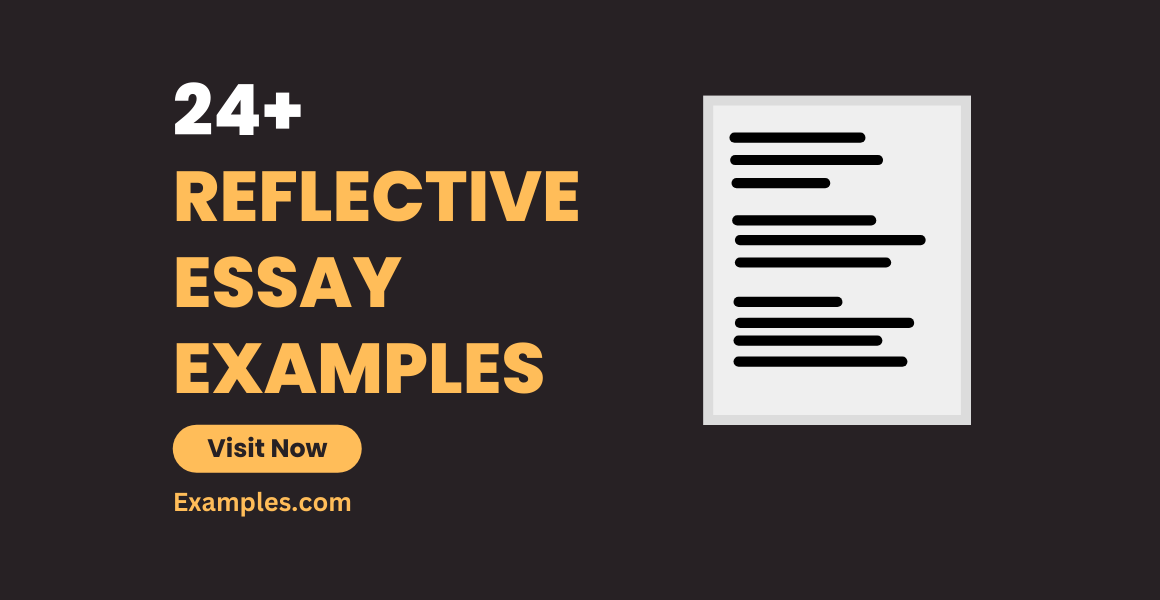
Sometimes, it is our experiences that startled and challenged our own voyage that strengthens and improves us to be the best versions of ourselves. If your life experience greatly moved you, there is a certain essay that allows you to compose your own endeavor. In this article, read through because we will be discussing the fundamentals of writing a reflective essay.
They say that being wise is better than being knowledgeable. Wisdom is acquired through reflection of one’s experience as well as of the environment. The more we reflect the more we become aware of ourselves. We become mindful of our existence as well as the meaning of life and all the things that surround us. Here we present different formats of essays like essays in doc .
Reflective Essay Outline Template
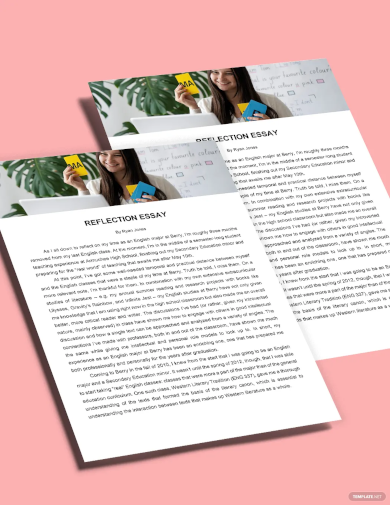
- Google Docs
Size: 188 KB
Reflective Essay About Life Experience
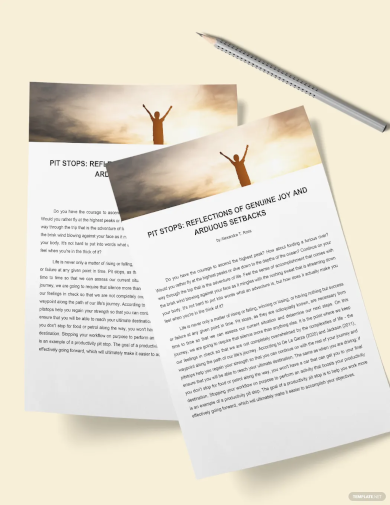
- Apple Pages
Size: 142 KB
Reflective Essay Template

Size: 237 KB
Self Reflective Essay Template
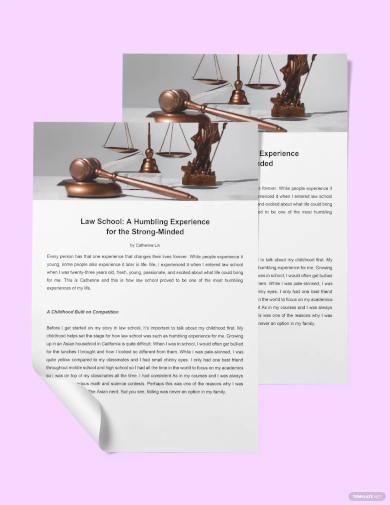
Size: 114 KB
Personal Reflective Essay Template
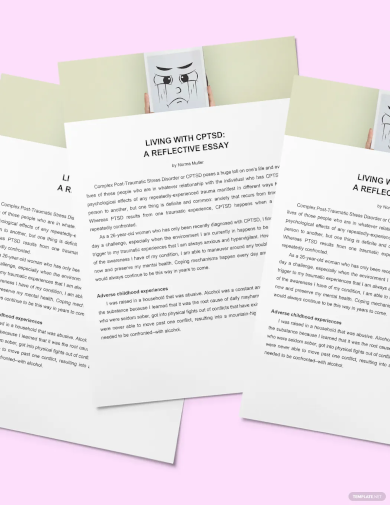
Size: 126 KB
Personal Reflective Sample
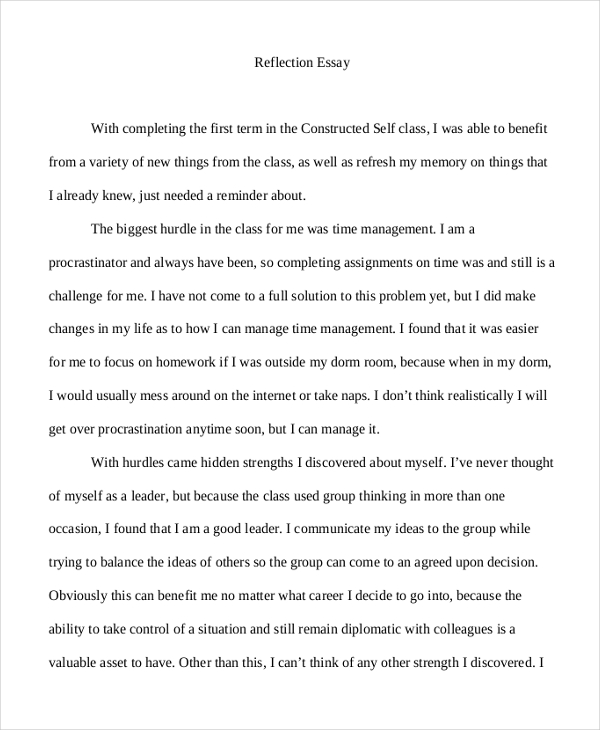
High School Essay
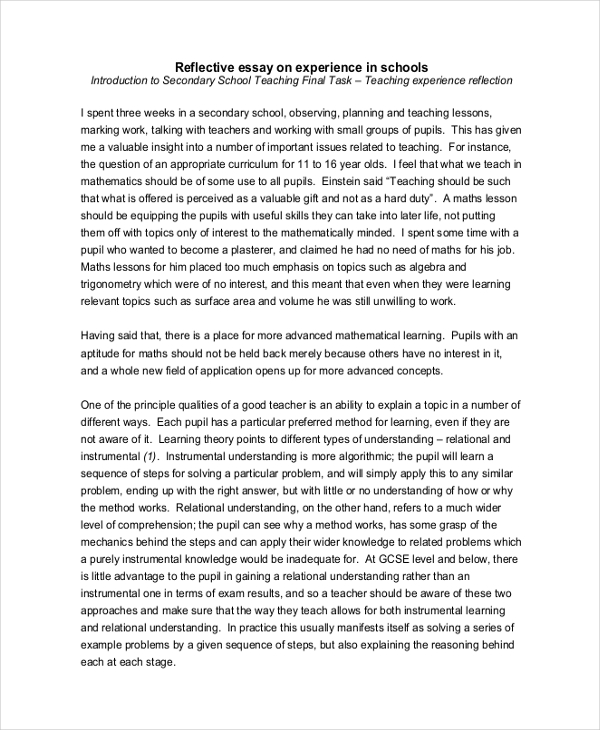
- PDFReflective Essay Example Reflective Essay Example Reflective Essay Example
Size: 102 KB
Reflective Essay Outline
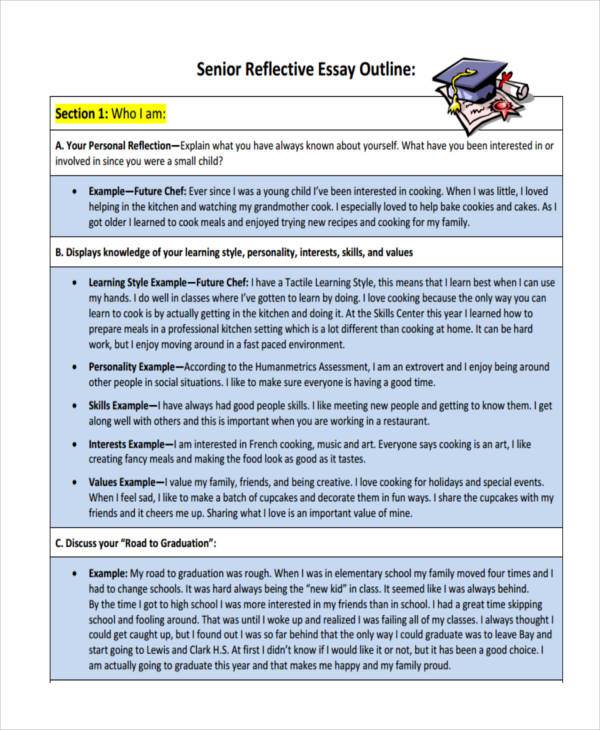
Size: 247 KB
Student Reflective Example
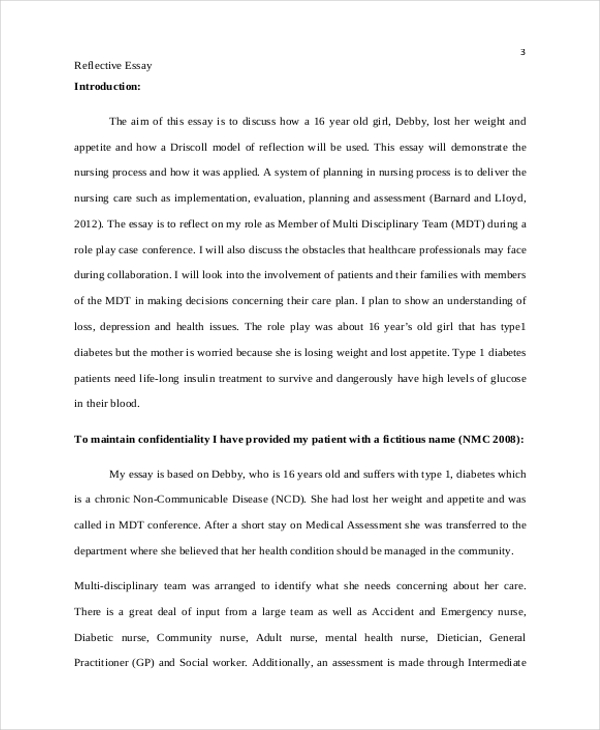
Size: 42 KB
Communication Reflective
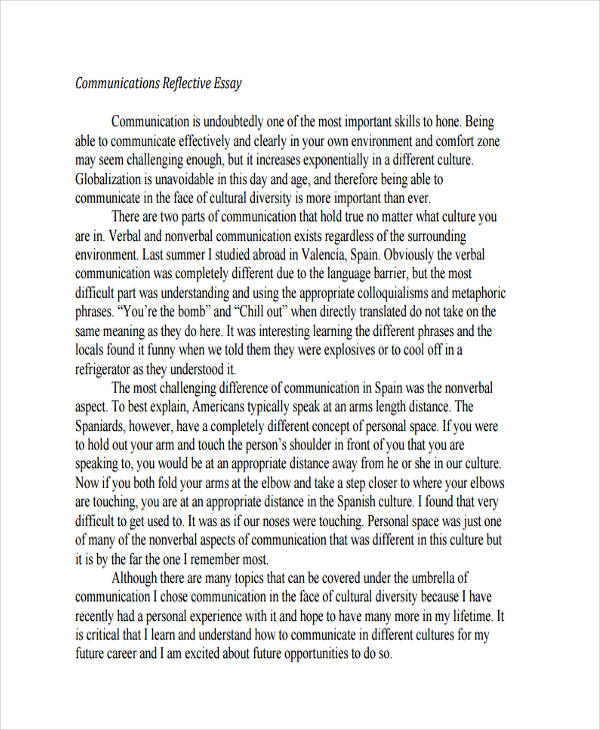
Size: 66 KB
What Is a Reflective Essay?
A reflective essay is a written piece of literature that focuses on presenting and narrating a person’s experience and how it becomes an instrument towards a change of perception in life.
It is a way for a writer to share an important event in his/her life and how it affected him/her so that others may learn something from it. Reflective writing root on life-changing events. The writer shares a specific experience, provides a narration of the incident including the material elements. It offers a realization so that others who may have had the same experience can draw out a shared mutual lesson from it.
How to Write a Reflective Essay
To write a reflective short essay , you need to have the right disposition as well as the momentum. Remember that you are not just writing to say something but to share an important lesson in life.
1. Think of an important event. What you will be writing on your reflective essay is something that is rooted in your own personal experience or encounter of something. Think deep and concentrate. You may also see personal essay examples & samples.
2. Introduce your topic. In your introduction, write the concrete event or experience that you want to share. Pattern it in a story form.
3. Develop your point. Write the main content of your essay with at least three to five paragraphs supporting your main topic.
Final Reflective Essay
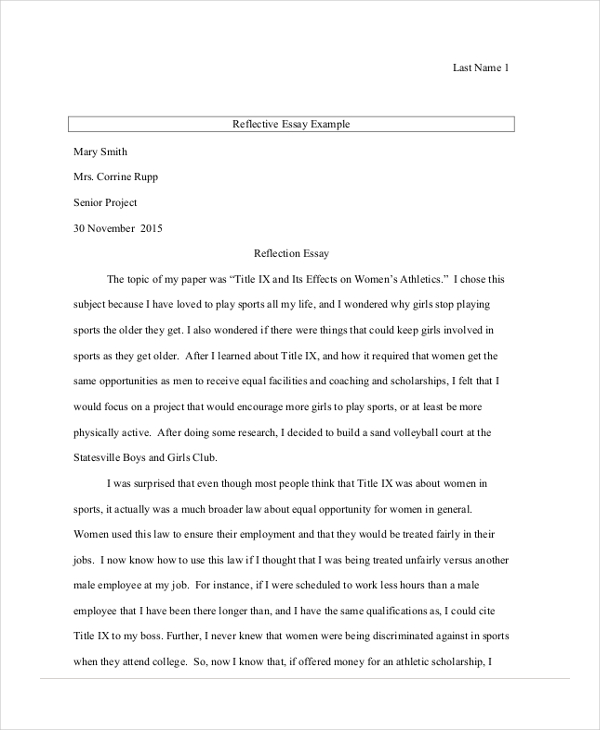
Size: 49 KB
Internship Reflective Essay
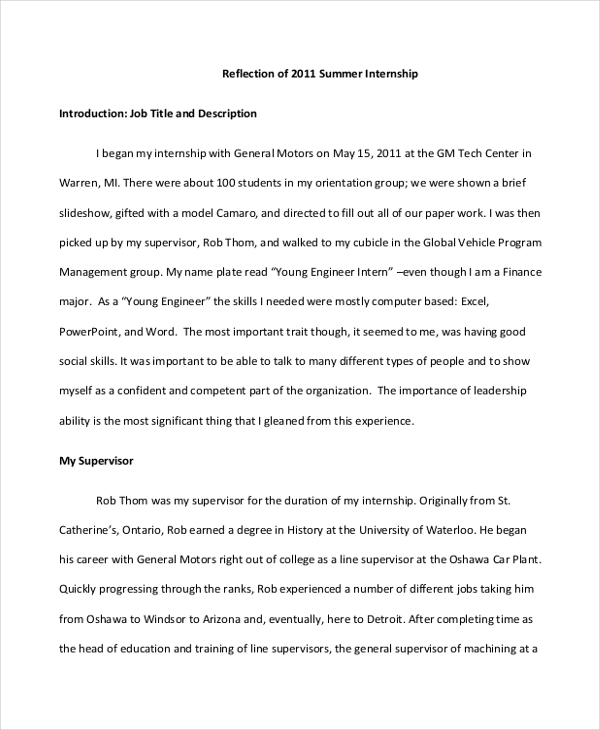
Size: 285 KB
Leadership Reflective Example
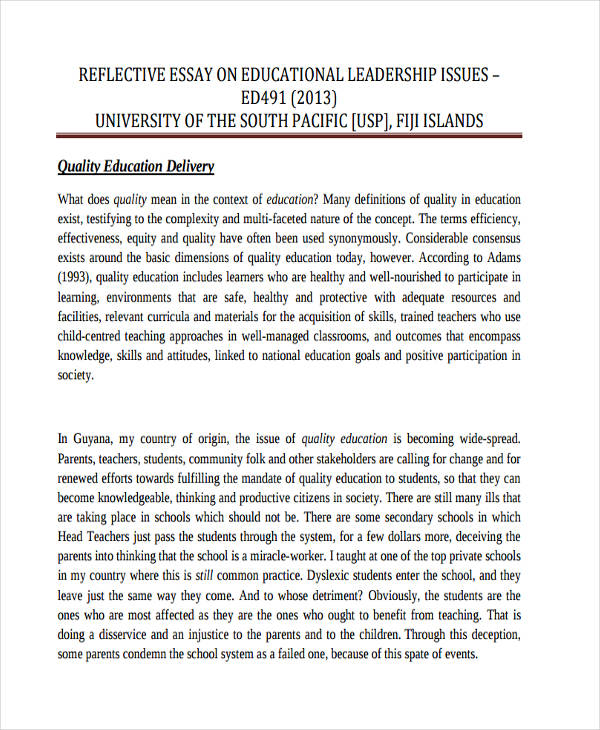
Size: 634 KB
Nursing Reflective Essay
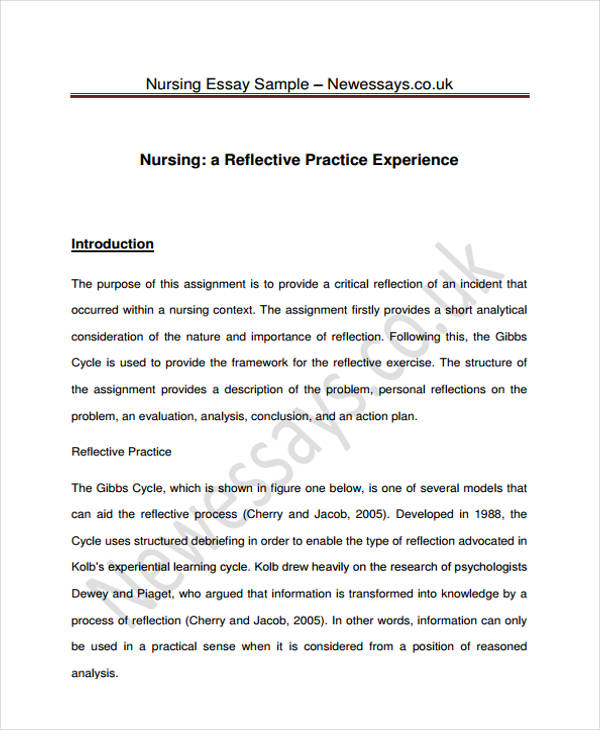
Size: 331 KB
Research Reflective Example
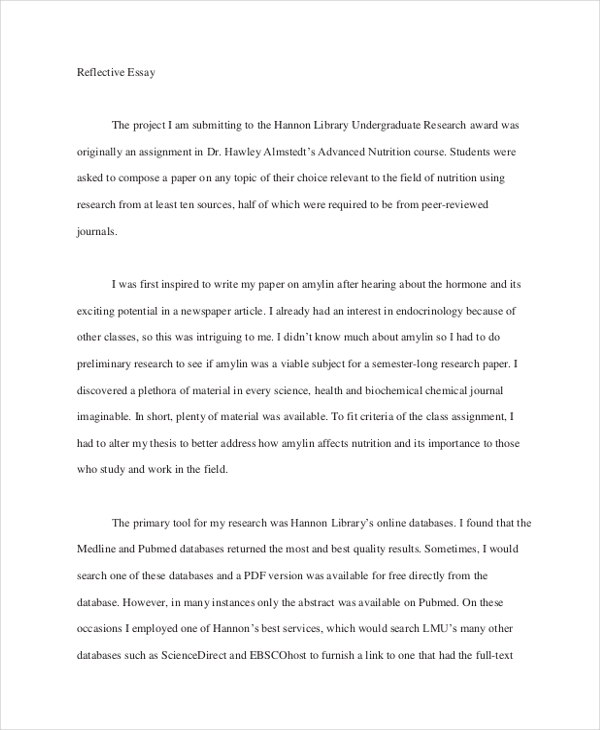
Size: 155 KB
Tips on Writing a Reflective Essay
Writing a reflective essay is not persuasive writing where you have to convince your readers to accept your opinion. You simply have to share an experience.
1. Write a draft. Do not jump hastily onto formal writing . Write a draft where you can create a bulleted list of the things that you want to share.
2. Think logically. When presenting a story, do it in a chronological manner so that your readers can understand the plot. Do this as well when presenting your ideas.
3. Create a summary. Use a summary writing to briefly state your insights and to give your final thoughts of the topic.
Importance of a Reflective Essay
In this era that we currently live in, personal reflection can be considered a thing of the past. Because of the gradual change and development of the things around us, we find it difficult to pause and reflect on the things that happen to our lives. You may also see academic essay examples .
The importance of writing an essay is to present to us the things that we rarely encounter in our day-to-day activities. In this time when material things are all that mattered, we have become unappreciative of the abstract things like love, compassion, and mercy. We cannot learn these things from those electronic gadgets that keep us busy.
How to Start a Reflective Essay Correctly
As mentioned above, a reflective essay presents and narrates the experience of a writer and how it changes the way he/she perceives life. In a simpler sense, it talks about how the author reflected on a certain adventure. As an essayist, since it’s you who bears the story and lessons, you are the one who is responsible for expressing it.
Just like any other composition, it’s your introduction that catches the attention of the reader. Thus, in order for your essay to be fully read, it is important to start your essay remarkably. If you find writing an introduction for your reflective essay challenging, don’t worry, you’re not alone. In this section, we are going to slowly tackle the ways to compose a compelling introduction.
1. Being catchy is the key.
In writing your reflective essay, you must start with something that would captivate the readers right away. Since the purpose of the introduction is to grab some attention, you may include some unique and interesting facts or beliefs. In this part, showcase your creativity by adding an introduction that is written in a bizarre manner and not those that depict cliché experience. You may also utilize a highly moving quotation or a dialogue that would also be appropriate for your reader.
2. Write the thesis statement in one sentence.
A thesis statement refers to the sentence that carries the topic being discussed in the whole essay. Therefore, it bears the central idea in which your essay revolves around. In writing your own essay, construct this statement in a clear and concise sentence. In this way, the reader will have a better grasp of your topic and would be clearly oriented on what you want to convey. In most cases, thesis statements are written at the end of the introduction.
3. Stick to the first person POV.
Remembering that this essay is subjective and depends on the author’s interpretation, it is important to use the first person point of view. By using this POV, it would be easier for you to convey your thoughts and opinions, and it would engage you to the readers like you’re telling a story in person. The first person involves the pronouns I , me , my , and mine .
4. Keep it brief.
When it comes to writing your own essay, you must perceive what your readers feel or see in reading your composition. Always put into mind that readers also have their own time to spend, and without a mark in the writing industry, people won’t invest much time on reading your essay. Thus, it is important to keep your composition concise. You can utilize a paragraph of five to ten sentences in your introduction. Using this number of sentences, you must already express a complete and clear thought of an essay that is worth reading.
Reflective Essay Example
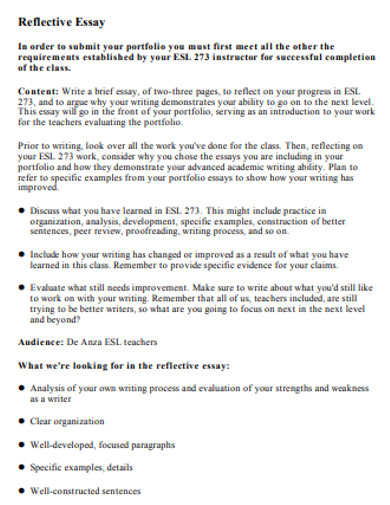
Size: 73 KB
Reflective Essay Assessment
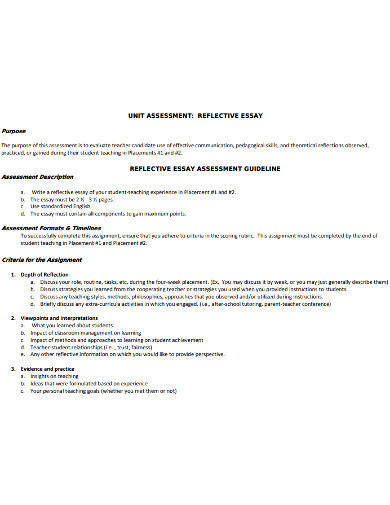
Size: 99 KB
Reflective Essay Format
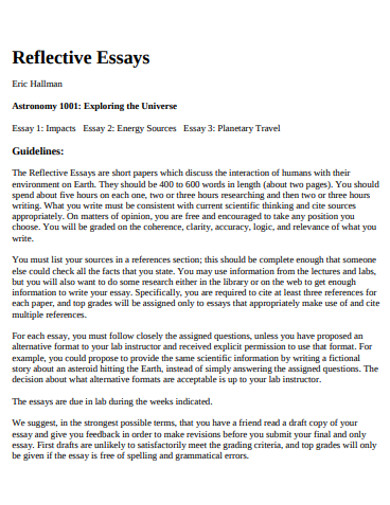
Size: 278 KB
Basic Reflective Essay
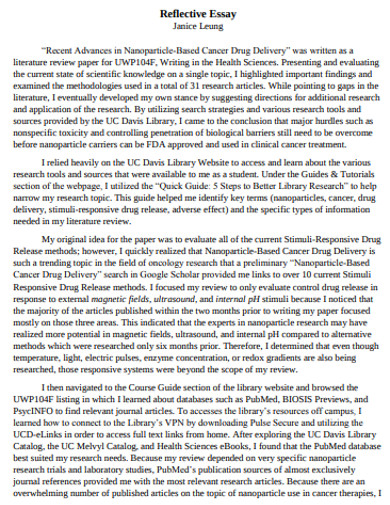
Size: 81 KB
Reflective Final Essay
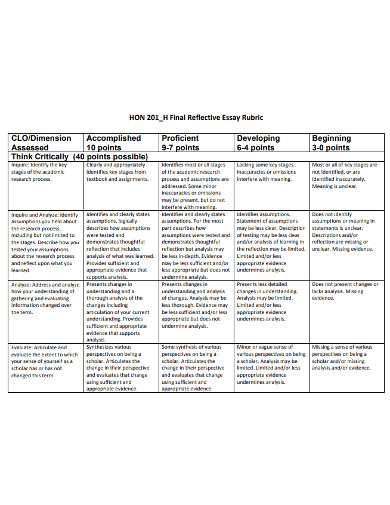
Size: 85 KB
Sample Reflective Essay
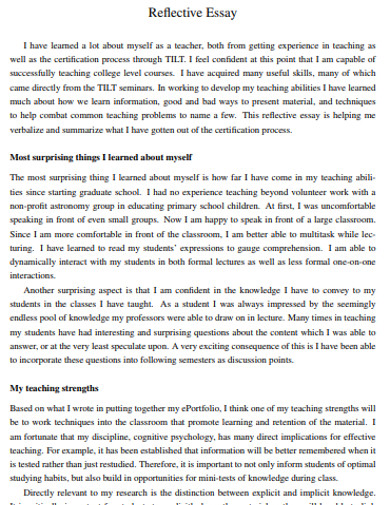
Size: 38 KB
Simple Reflective Essay Example
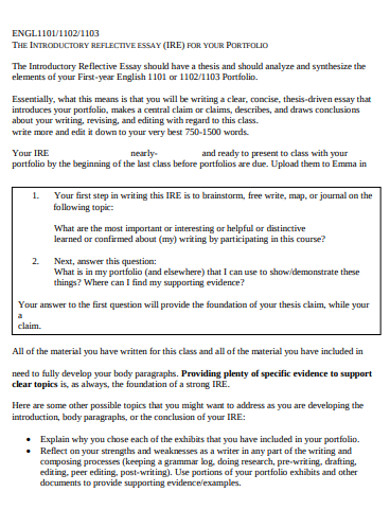
Size: 193 KB
Standard Reflective Essay
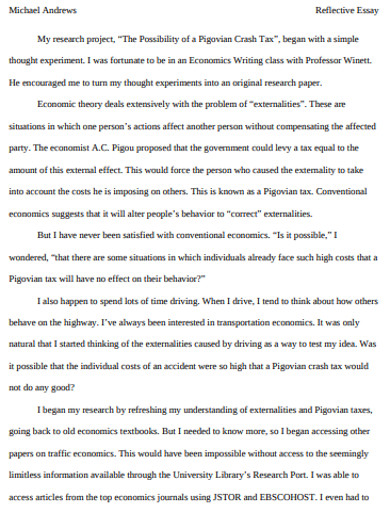
Professional Reflective Essay
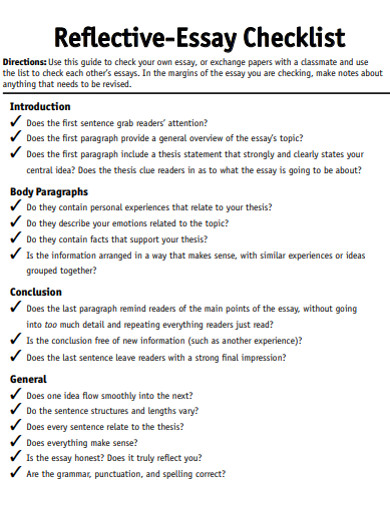
Size: 264 KB
Sample Reflective Essay in PDF
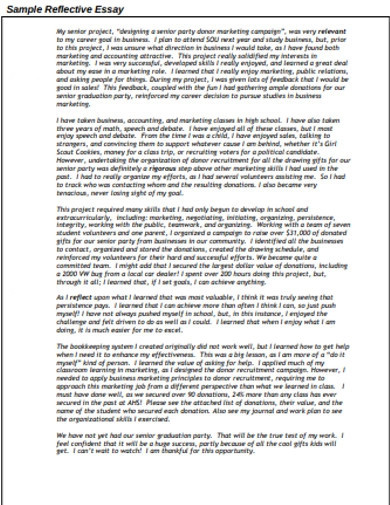
Size: 26 KB

Reflective Essay Generator
Text prompt
- Instructive
- Professional
Write a Reflective Essay on your most meaningful learning experience.
Create a Reflective Essay about a time when you showed leadership.
How to Write a Reflective Essay: Examples, Intro, Body, & Conclusion
22 December 2023
last updated
This article is a guideline on how to write a good reflective essay, addressing the areas students should pay attention to when their lecturers give them assignments to produce such papers. Basically, a reflective essay examines the writer’s experience in life. People explore how their involvement changed or developed their characters and gather accurate details to support the main argument. In this case, each topic is essential because it teaches readers most important details that should guide their writing, from choosing a topic, following the correct outline, and going through each technical step to produce a quality document. Reading this guideline gives writers critical insights on writing an outstanding reflective essay, guaranteeing they can create a high-quality paper under any context. Although the article focuses on students as the primary audience, anyone needs to understand that an effective reflective essay should have a proper introduction, a compelling body, and a conclusion that brings an appropriate closure and apply the knowledge to be an expert, thoughtful essay writer.
General Aspects for Writing an Outstanding Reflective Essay
When lecturers give students writing reflection papers, they aim to develop intellectuals. The writing process of different types of papers demands learners to utilize their academic training to produce knowledge that others can consume for enlightenment. As such, various types of essays are central to providing college students with a platform for their reflection papers, constructing their intellectual personas and influencing others. Reading this guideline helps students and anyone interested in writing to gain insights into essential requirements when organizing essays. Specifically, this article provides a guideline for writing a reflective essay by addressing key aspects that authors of reflection papers need to know and essay topics they can choose to produce a high-quality scholarly document.

For writing your paper, these links will be helpful:
- Essay Writers Online
- 5 Parts of an Essay
- How to Write a 5-Paragraph Essay
- How to Write a Critical Response Essay
- Essay Rubric
Definition of What Is a Reflective Essay and Its Meaning
A reflective essay is a document whose primary focus is the writer’s self-reflection on his or her experience or a topic. Ideally, students writing a reflective essay must use their creative thinking skills to examine an experience or an issue and clearly state what it means to them without relying on others’ inputs. Therefore, the main purpose of writing a reflective essay is to present the writer’s own perspective on an issue. College professors assign their students tasks to write these essays because they understand that applying knowledge is the most effective strategy meaning to entrench knowledge. Self-reflection on an experience or topic means the way in which students apply what they have learned and create new knowledge through creative thinking. However, a reflective essay is not similar to an argumentative essay , an analytical essay , a cause and effect essay , an expository essay , or a research paper because, while writing about personal aspects allows students to use their own knowledge and experience, other papers have different purposes and requirements.
Common Types of Reflective Essays
Reflective essays take different forms because limiting what students can reflect on is impossible. Typically, English professors require students to write thoughtful texts about what they have read or studied in class and their experience on something personal as their reflection. The reasoning behind such expectation is that human beings have the imagination to judge events that occur in diverse contexts. Everyone learns something from experiences that shape their existence. Hence, when writing a reflective essay, students must first understand its purpose because it forms the foundation of their focus.
Join our satisfied customers who have received perfect papers from Wr1ter Team.
Reflection on an Assigned Reading
College students read various texts in any semester, including assigned textbooks, articles, research papers, essays, reflections, commentaries, and opinions. These documents have one similarity in common since they all address topics lecturers consider important to learners’ intellectual development. In this respect, it is common for students to receive paper assignments requiring them to write a reflective paper on an article, poem, play, novel, or research topic. While professors often specify essay topics, students may encounter scenarios where they must construct sentences themselves. The most important thing they must consider when organizing reflection papers properly is that they must reflect the text the tutor prescribes.
Writing a Reflective Essay About an Article
Articles are texts commonly found online where writers pick an issue of concern to society or a specific community and discuss it from various perspectives as a reflection. For example, authors of articles posted in the New York Times journal may write about how social policies of the New York state government have contributed to homelessness. Some authors may claim that these policies have resulted in high rental prices, forcing many individuals and families to seek alternative accommodation, including living with relatives and in homeless shelters. A lecturer may require students to write a reflective essay on such articles. In turn, one must read the online article to understand the author’s perspectives in such an instance. As a result, students must reflect on how these viewpoints apply to them, people they know, and society. Their reflection paper writing should underscore the article’s significance.
Writing a Reflective Essay About a Poem
Poems are texts that paint a picture of society through words. Like art, they address many societal issues, such as leadership, love, family, morality, and tragedy. However, unlike most texts, poems are complex since their language requires readers to engage in critical thinking and reflection. Like an artist hides a message in a mural, a poet uses words to communicate deep insights. As such, lecturers often require students to read poems and write reflective papers. In such a scenario, students should read poems through their creative thinking lens and pick critical insights that they can expound on. However, their exposition and reflection should be based on what they think and not what others say.
Writing a Reflective Essay About a Play
Like poems, plays serve the purpose of communicating ideas with a profound message or hidden meaning. It is common for college students to read plays as part of course content and write reflection papers. As such, reflecting on such literature plays helps learners to apply knowledge to specific contexts. Therefore, when writing a reflective essay on a poem, students should read assigned plays to understand the information or knowledge the author intends to convey. The next step is to write a paper that allows them to self-reflect by explaining how the profound message or hidden meaning applies to real life.
Writing a Reflective Essay About a Novel
Unlike plays and poems, novels are long texts. Nonetheless, they are similar to the extent they address issues common in society. Most novelists use their creative imagination and reflection to communicate social problems through texts. Therefore, reading novels across generations is the best way to know how modern society reflects human civilization. With this understanding, English professors often require students to read novels and write reflective essays for the final semester assessment. In such a context, students should read the novel and interact with other materials about this work, such as commentaries and reviews by different authors. However, these texts should only help students to better understand the novel rather than form part of a reflective essay.
Writing a Reflective Essay About a Research Topic
It is common for college students to read research topics as part of their academic work. Almost all disciplines have issues that attract the attention of researchers. However, social sciences tend to have the highest level of this attention and reflection because they are about the social world. One approach lecturers in social sciences develop students into intellectuals requires them to analyze different research topics and produce a reflection paper. If students receive such instructions, they should read the study to understand critical points. Because researchers tend to be broad in assessing issues, writers should narrow their focus by picking a problem they think has the greatest significance to them or an aspect of their academic or social environment.
Reflection on an Experience
The most effective way of helping students to gain a deeper understanding of concepts, thoughts, and ideas is to require them to apply what they have learned to their personal lives as their reflection. Like everyone else, learners have personal experiences that enrich their existence despite their impact. In other words, a unique experience may have been pleasant or unpleasant. In turn, people can always get a moral lesson if they view it through optimism. Lecturers often require students to write reflective essays on personal experiences, including a life event, work experience, peer relation, domestic experience, and a hobby.
Writing a Reflective Essay About a Life Event
It is natural for everyone to experience a life event that leaves a lasting impact on them and close relations, including parents, siblings, friends, and even neighbors. Examples of these events include a near-death experience, such as an automobile accident, a chronic disease, or a personal loss, such as losing a parent. While these events are unique, they can trigger people’s creative imagination and reflection if they are discussing such topics. Lecturers understand this truth, and they give their learners assignments to write reflective essays about personal experiences. When students receive such instructions, they should use their imagination and reflection to link what they have learned with what happened to them in the past that remains significant today. Doing so gives a reelection essay a scholarly characteristic, allowing it to be an academic text others can consume.
Writing a Reflective Essay About a Work Experience
Working is an activity that no one can avoid from adolescence. While students may not be employable because they are yet to complete their education, employers give them opportunities to gain practical work experience along their academic journey. Work attachments are integral to a college education because they allow students to experience the work environment before graduation. Moreover, some students come from families with established businesses, while others seek employment during holidays to fund their education. This reality explains why professors ask learners to write reflective essays about a work experience. Under such an instruction, students should recall and talk about an incident in a work environment with a lasting impact as their reflection.
Writing a Reflective Essay About a Peer Relation
Peer relations are rich sources of personal experiences for college students. As social beings, adolescents develop friendships with their peers in diverse environments, including schools, workplaces, and neighborhoods. For example, a significant peer relationship reflection can be romantic or friendly. Almost every college student has experienced a romantic encounter that left them with lasting memories. Professors can ask their audience to write a reflective essay on a romantic relationship and how it generally shapes their view of life. In such a reflection paper, writers should include how the relationship challenged their perceptions or entrenched ideals, like commitment and honesty. In turn, people can focus on friendship and how it changed their lives. Essentially, the text should focus on the dynamics that shaped the relationship, such as availability, and how they think they are essential or nonessential for a lasting engagement.
Writing a Reflective Essay About a Domestic Experience
The domestic environment directly impacts people’s attitudes and behaviors. It is impossible for one to live without the influence of parents, whether biological or foster, guardians, or siblings. Standard domestic experiences for writing a reflection paper include family vacations, parental divorce, domestic violence, or events like family get-togethers. Lecturers often require students to think about how such experiences have impacted their worldview, including entrenching values, like hard work, empathy, and integrity. When students have to write a reflective essay on a domestic experience, their focus should be on events that have a lasting impact on their memory. Such events are easy to evaluate because they stand out in the writer’s behavior and mannerisms.
Writing a Reflective Essay About a Hobby
Hobbies are personal engagements that form part of a person’s social experience. People have different hobbies because only some of them are fascinated by one thing, like watching a football game or hiking a mountain. However, everyone has an interest they engage in as a form of unwinding after a difficult task or life season. College tutors view reflective essays as essential for students to relate their hobbies to a course concept or idea. When learners receive instructions to write such a paper, they should be honest and talk about their hobby, not someone else’s. Ideally, reflections enable students to view their hobbies through the lens of coursework .
Receive personalized assistance from our writers, ensuring your paper is both original and tailored to your needs..
Examples of Reflective Essay Topics
Since everyone has unique experiences and perspectives on different reflective essay topics , lecturers often instruct students to write reflective essays without specifying the topic. However, reflecting on a text differs because the lecturer can select the reading. When it comes to individual experience, students have a free hand in deciding personal essay topics . As a result, some examples of reflection essay topics students and other people can choose to write about are:
Sample Topics on Assigned Readings
- How “Frankenstein” by Mary Shelley Applies to Contemporary Society
- The Moral Lesson in the Play “Hamlet” by William Shakespeare
- The Essence of Morality Through the Lens of the Poem “Morality” by Mathew Arnold
Topics on a Personal Experience
- Overcoming a Fear That Changed My Life
- The Challenges of Long-Distance Dating
- How Family Fosters Togetherness
- How a Near-Death Experience Shaped My Ideals
Outline Example for Writing a Reflective Essay
I. College Essay Introduction
- Attention-grabbing hook : Dating is a social experience shaped by multiple dynamics.
- Overview of the topic: The challenges of long-distance dating.
- Thesis statement : Long-distance dating has taught me that human beings are naturally dishonest, love cannot flourish without supervision, and faithfulness results from commitment.
II. Body Paragraphs
- First paragraph : Open with a topic sentence about the first lesson and provide a reflection paper for this first lesson.
- Second paragraph: Present the second lesson and reflect on this second lesson.
- The third paragraph: Start by emphasizing the third lesson and write a reflection for this third lesson.
Note: The number of body paragraphs depends on the length of the assignment. Usually, the length of a reflective essay is about 500-1000 words, which means 2-4 double spaced pages or 1-2 single spaced pages.
III. Conclusion
- Summary of body points
- Restate the thesis statement of a reflection
- Conclude with a final remark
Example of a Good Reflective Essay
Topic: The Challenges of Long-Distance Dating
I. Example of an Introduction for Writing a Personal Essay
Dating is an experience that enriches one’s worldview because of the dynamics that shape it. However, long-distance dating has significant drawbacks that create the wrong impression about dating as a social experience. My experience with long-distance dating is awful because I have learned that human beings are naturally dishonest, love cannot flourish without supervision, and faithfulness is a product of commitment.
II. Example of the First Body Paragraph for Writing a Personal Essay
Long-distance dating challenges the adage ‘honesty is the best policy’ because it reveals humans as naturally dishonest. After my reflection, I learned this painful lesson when I developed a relationship with a friend I met online in my early adolescence. Since this period of growth is when individuals develop most peer relationships, dating is common among youth, especially those in college. The essence of dating for many adolescents is the freedom it represents since one can choose whom they love without social restrictions. However, dating someone you do not regularly meet because of distance is troublesome. After meeting someone on the Internet I thought was a perfect match for me, I hoped to develop a lasting romantic relationship. However, things turned ugly when I learned that the person of my dreams was married. This experience convinced me that human beings are naturally dishonest.
III. Example of the Second Body Paragraph for Writing a Personal Essay
The greatest lesson from my dating experience is that love cannot flourish without supervision and reflection. I always tell myself it was good that I discovered the person was married because I would have continued investing emotionally in a relationship built on a lie. My desire to know my online date more closely saved me from the futile endeavor. Generally, this burning interest to learn more is a form of social supervision because it helps one to discover truths. Although my reflection quest for truth led to the end of the relationship, it helped me to learn that love cannot flourish if no one desires to know more about their partner. I consider this desire to know as supervising love.
IV. Example of the Third Body Paragraph for Writing a Personal Essay
More importantly, my experience with long-distance dating taught me that faithfulness is a product of commitment. I was committed to the relationship because I was faithful, neither married nor dating anyone else. Unfortunately, my partner was not trustworthy because this person was married, explaining why he was less committed to investing emotionally in the relationship. The genesis of my reflection quest for more information about him was that he turned down several of my requests for a physical meet-up. After learning he was married, I understood why he would not agree to meet physically because he was not committed to the relationship. To him, dating was a passive hobby.
V. Example of a Conclusion for Writing a Personal Essay
The above experiences with long-distance dating have shaped my worldview about people and love. While one may consider some individuals pleasant or unpleasant, all are transformative because they have shifted my perceptions. They have convinced me that people are naturally dishonest, one cannot nurture love without supervision, and commitment births faithfulness. While my experience was awful, these lessons are essential for my reflection and emotional well-being in my future romantic relationships.
4 Easy Steps for Writing a Reflective Essay
While reflection writing is straightforward, producing a reflective essay can be complex because one must observe technical details that shape a high-quality paper. Ideally, students should approach a reflective essay as an academic exercise because there are specific issues and rules they must observe and satisfy to make their work meet the requirements of such a document. These issues include sufficient preparation, setting up the stage, producing a first draft, and perfecting a final draft. Important rules include creating an error-free paper, meaning a good reflection paper must not have grammar or formatting mistakes or plagiarized information.
Step 1: Preparation
In this first step, students must prepare themselves by doing specific things. Firstly, they should choose a particular topic of interest and define it. Ideally, the topic should indicate the kind of essay they want to produce, whether a self-reflection about a text or a personal experience. In the case of the former, the lecturer specifies the topic. The next task is to prepare ideas through brainstorming with classmates or friends while considering the audience of their work. A good reflective essay should be an academic paper that meets quality standards because those who will consume it include the lecturer, fellow students, and anyone wanting to know more about the topic. When writing a reflective essay, students should understand that the purpose of their texts is to provide an opportunity for self-reflection by presenting their papers.
Step 2: Setting Up the Stage
The next step in writing a reflective essay is to set up the stage where students need to consider several tasks. The first aspect is to find credible sources if the mission is to talk about assigned readings, such as a poem, short story, or novel. Locating reliable sources is vital to ensure one stays within the topic. Secondly, one should read valid sources while making notes. For reflection papers, they should use the ideas generated in the preparation stage to guide note-taking. The third task is creating a well-organized essay structure and essay outline that reflects the standard format of this type of essay as described by the sample above. Lastly, writers should create an annotated bibliography to ensure that borrowed information in the text has a corresponding original source. Doing so helps avoid plagiarizing the work. However, this task does not apply to an essay about a personal experience.
Step 3: The Writing Process
The third step in producing a reflective essay is to create a first draft. At this stage of writing a reflective paper, students should focus on capturing all the ideas generated when preparing to execute the task. As such, they should not worry about the quality, like grammar and formatting. The importance of a first draft is that it allows writers to put their ideas together. If a particular reflection topic is about assigned readings, students may use this stage to find more sources that help to expand their reasoning. They may also alter the outline to accommodate any additional instructions, such as the length of the paper. The most important thing one should do is develop a clear thesis statement because it should guide their work.
Writing the Introduction
The introduction is the first part of any essay and contains the overall focus of the paper. When developing this part for a reflective essay, students should ensure they capture the reader’s attention, establish the topic’s background, and conclude with a thesis statement. They also should provide background information about the topic. In reflection papers, these three components are essential features of an essay’s opening section. To a greater extent, they determine whether the audience will complete reading the text. Students should know — people do not read unexciting texts when organizing this section. Such texts lack a hook that grabs one’s attention and ignites a desire to learn more in the rest of the paper.
Writing Body Paragraphs
The body of a reflective essay should capture all the ideas that writers have generated in the preparation stage. However, the tutor’s instructions regarding the college essay length should determine whether writers use all the ideas, add new ones, or drop some of them. Each paragraph should open with a topic sentence emphasizing an idea in the thesis statement. These ideas may be lessons for a reflection paper about a personal experience, but, if the focus is on reading the article, they should be arguments or observations since specific details and evidence make the work compelling. In turn, real-life examples make a reflection relevant and persuasive. Ideally, this part of a reflection paper should cover an evidence-based format by integrating course concepts and ideas. All parts must relate to one another, while achieving a proper flow of ideas improves the quality of a reflective essay. People should use the rest of the paragraph to explain the lesson or observation or enrich the argument. Other essential components of each paragraph include a concluding sentence and a transition. Therefore, body paragraphs of a reflection paper
Writing the Conclusion
The conclusion paragraph is the last part of a reflective essay. The most important features include summarizing the paper by emphasizing key lessons for a piece about a personal experience or arguments or observations for an article about a text. Basically, writers sum up all the main points discussed in the body. The next quality is restating the thesis statement by rewording it, and lastly, is to make a final remark about the topic. Such a remark must underscore writers’ primary worldviews as a product of their reflection. Therefore, when organizing this section, students should know that their focus is to finalize the text by making declarations that allow readers to be satisfied. It is illogical for a paper to leave a reader hanging unless it is fiction. Thus, one should bring a reflective essay to a logical closure.
Step 4: Wrapping Up the Paper
The last step in writing a reflective essay is to produce a final draft by perfecting a first draft. This wrap-up exercise involves revising the first version of the text to ensure it captures all the author’s ideas. The second task for writing a reflection paper is to edit the text by adding or eliminating sentences to provide a logical flow of ideas and thoughts. The next mission is to ensure all three parts — introduction, body, and conclusion — capture all essential features, including thesis, topic sentences, and final remarks, as appropriate. The last task is to eliminate all mistakes, including grammatical errors, incorrect punctuation, formatting flaws, and missing citations. To produce a perfect reflection paper, one must familiarize themselves with all rules of academic writing and use them as the measure for polishing a final draft.
Important Rules for Writing a Reflective Essay
When writing a reflective essay, students should observe all the rules applicable to their work, even if the lecturer does not emphasize them. The first convention that one should satisfy is to maintain a formal tone. Apart from using the first-person voice, students should ensure their work is academic. As such, they should avoid slang and any language that dilutes the formality of their text, and they need to write following the active voice. Another convention to consider when writing a reflection paper is to cite ideas that writers borrow from different sources. For example, when students use quotes from the text they are reflecting on, such as an online article, they should cite it properly by paying attention to APA, MLA, Harvard, and Chicago/Turabian writing styles.
Summing Up on How to Write a Perfect Reflective Essay
- Reflective essays allow students to discuss relevant events or course readings that influenced their lives.
- This guideline shows that writing a good reflective essay is a rigorous exercise that requires one to understand several tips.
- Understand the topic when writing a reflection essay: whether one is to reflect on a text or a personal experience.
- Brainstorm and create a mental database of ideas.
- Develop a clear outline that emphasizes the introduction, body, and conclusion and the key features of each.
- Review all the technical steps of producing a high-quality reflective essay.
- Produce a first draft and then perfect a document into a final draft by eliminating all mistakes, like wrong grammar, poor formatting, and illogical sentences.
- Proofread final drafts before presenting them to lecturers.
- It is advisable to give the final draft to someone to read a reflection paper and avoid missing out key details or obvious mistakes.
- Jump to menu
- Student Home
- Accept your offer
- How to enrol
- Student ID card
- Set up your IT
- Orientation Week
- Fees & payment
- Academic calendar
- Special consideration
- Transcripts
- The Nucleus: Student Hub
- Referencing
- Essay writing
- Learning abroad & exchange
- Professional development & UNSW Advantage
- Employability
- Financial assistance
- International students
- Equitable learning
- Postgraduate research
- Health Service
- Events & activities
- Emergencies
- Volunteering
- Clubs and societies
- Accommodation
- Health services
- Sport and gym
- Arc student organisation
- Security on campus
- Maps of campus
- Careers portal
- Change password
Examples of Reflective Writing
Types of reflective writing assignments.
A journal requires you to write weekly entries throughout a semester. May require you to base your reflection on course content.
A learning diary is similar to a journal, but may require group participation. The diary then becomes a place for you to communicate in writing with other group members.
A logbook is often used in disciplines based on experimental work, such as science. You note down or 'log' what you have done. A log gives you an accurate record of a process and helps you reflect on past actions and make better decisions for future actions.
A reflective note is often used in law. A reflective note encourages you to think about your personal reaction to a legal issue raised in a course.
An essay diary can take the form of an annotated bibliography (where you examine sources of evidence you might include in your essay) and a critique (where you reflect on your own writing and research processes).
a peer review usually involves students showing their work to their peers for feedback.
A self-assessment task requires you to comment on your own work.
Some examples of reflective writing
Social science fieldwork report (methods section), engineering design report, learning journal (weekly reflection).
Brookfield, S 1987, Developing critical thinkers: challenging adults to explore alternative ways of thinking and acting , Open University Press, Milton Keynes.
Mezirow, J 1990, Fostering critical reflection in adulthood: a guide to transformative and emancipatory learning , Jossey-Bass, San Francisco.
Schön, DA 1987, Educating the reflective practitioner , Jossey-Bass. San Francisco.
We thank the students who permitted us to feature examples of their writing.
Prepared by Academic Skills, UNSW. This guide may be distributed or adapted for educational purposes. Full and proper acknowledgement is required.
Essay and assignment writing guide
- Essay writing basics
- Essay and assignment planning
- Answering assignment questions
- Editing checklist
- Writing a critical review
- Annotated bibliography
- How do I write reflectively?
- Examples of reflective writing
- ^ More support
Study Hacks Workshops | All the hacks you need! 7 Feb – 10 Apr 2024

- Schools & departments

Reflective essays
Guidance and information on using reflective essays.
The reflective essay is one of the most common reflective assignments and is very frequently used for both formative and especially summative assessments. Reflective essays are about presenting reflections to an audience in a systematic and formal way.
Generally, all good academic practice for assignments applies when posing reflective essays.
Typical reflective essay questions
Reflective essays tend to deal with a reflective prompt that the essay needs to address. This also often means that the essay will have to draw on a range of experiences and theories to fully and satisfactorily answer the question.
The questions/prompts should not be too vague, for example ‘reflect on your learning’, but should define an area or an aspect relevant to your learning outcomes. This is most easily ensured with thorough guidelines, highlighting elements expected in the essay.
Questions could be something like (not exhaustive):
- reflect on learning in the course with regards to [choose an aspect]
- reflect on personal development across an experience with regards to certain skills
- reflect on development towards subject benchmarks statements and the extent to which these are achieved
- reflect on the progression towards the course’s defined learning outcomes or the school’s or the University’s Graduate Attributes
- reflect on some theory relevant to the course. (Remember that for this to be a reflective essay and not an academic/critical essay, the student must use that theory to explain/inform their own experiences, and use their own experiences to criticise and put the theory into context – that is, how theory and experience inform one another.)
Typical structure and language
Reflective essays will often require theoretical literature, but this is not always essential. Reflective essays can be built around a single individual experience, but will often draw on a series of individual experiences – or one long experience, for example an internship, that is broken into individual experiences.
The typical language and structure is formal – for thorough descriptions on this, see ‘Academic reflections: tips, language and structure’ in the Reflectors’ Toolkit, which can be valuable to highlight to students.
Academic reflections: tips, language and structure (within the Reflectors’ Toolkit)
Length and assignment weight if assessed
There is no one length that a reflective essay must take. As with all written assignments, the main consideration is that the length is appropriate for evidencing learning, answering the question and meeting the criteria.
Similarly, there is no clear answer for what percentage of the overall mark is attached to the assignment. However, the choice should mirror the required workload for the reflector to complete it, how that fits into your initiative, and the amount of preparation the reflector has had.
For instance, if the student has received formative feedback on multiple pieces of work, a larger proportion of the course mark may be appropriate, compared to if the student had not had a chance to practice. It is important to keep in mind that many students will not have had many chances to practice reflective essays before university.
Back to ‘Components of reflective tasks’
Home — Essay Samples — Literature — Poetry — Reflection Of Writing Poetry
Reflection of Writing Poetry
- Categories: Poetry
About this sample

Words: 1137 |
Published: Mar 19, 2024
Words: 1137 | Pages: 2 | 6 min read
Table of contents
I. introduction, ii. the creative process of writing poetry, iii. the reflective nature of poetry, iv. impact of writing poetry on personal growth, v. challenges and benefits of reflecting on one's writing, vi. conclusion, a. inspiration and ideas for poetry, b. techniques and styles of writing poetry, c. the role of emotions in poetry writing, a. exploring personal experiences and emotions through poetry, b. using poetry as a form of self-expression and self-discovery, c. reflecting on societal issues and personal beliefs through poetry, a. developing empathy and understanding through poetry, b. building self-awareness and self-acceptance through poetry, c. fostering creativity and critical thinking skills through poetry, a. overcoming writer's block and self-doubt in poetry writing, b. the therapeutic benefits of writing poetry for mental health, c. the importance of feedback and revision in poetry writing.

Cite this Essay
Let us write you an essay from scratch
- 450+ experts on 30 subjects ready to help
- Custom essay delivered in as few as 3 hours
Get high-quality help

Prof Ernest (PhD)
Verified writer
- Expert in: Literature

+ 120 experts online
By clicking “Check Writers’ Offers”, you agree to our terms of service and privacy policy . We’ll occasionally send you promo and account related email
No need to pay just yet!
Related Essays
2 pages / 1000 words
3 pages / 1484 words
4 pages / 1811 words
3 pages / 1304 words
Remember! This is just a sample.
You can get your custom paper by one of our expert writers.
121 writers online
Still can’t find what you need?
Browse our vast selection of original essay samples, each expertly formatted and styled
Related Essays on Poetry
"Ballad of Birmingham" is the author of the poem that revolves around a little girl who would like to go downtown to take part in a freedom protest. Her mother, however, says that she cannot go because of the dangerous [...]
Hilda Morley’s ‘Winter Solstice’ is an overt poem primarily aimed at describing a winter solstice. Correspondingly, the author has dotted the poem with descriptive words meant to create a mental picture of a solstice in a [...]
In the contemporary society, many people undergo challenges depending on the nature of their environment, or sometimes due to uncertain circumstances for which they have no control. Yet amidst the challenges, they often hold [...]
In the poem "One Boy Told Me" by Naomi Nye, the poet exudes sensitivity, compassion and great heart. Nye touches on her diverse personal experiences that form the backbone of the poem. It is very interesting the way she brings [...]
Dialectical structure is probably one of the major characteristics of all Metaphysical poetry. Donne was the pioneer of this type of poetry, which was marked by erudite scholarship, and difficulty of thought. It is said that a [...]
“Whenever a thing is done for the first time, it releases a little demon” (Dickinson, n.d.). At first glance, this utterance by Emily Dickinson conveys a negative attitude towards the unique and the new. However, upon second [...]
Related Topics
By clicking “Send”, you agree to our Terms of service and Privacy statement . We will occasionally send you account related emails.
Where do you want us to send this sample?
By clicking “Continue”, you agree to our terms of service and privacy policy.
Be careful. This essay is not unique
This essay was donated by a student and is likely to have been used and submitted before
Download this Sample
Free samples may contain mistakes and not unique parts
Sorry, we could not paraphrase this essay. Our professional writers can rewrite it and get you a unique paper.
Please check your inbox.
We can write you a custom essay that will follow your exact instructions and meet the deadlines. Let's fix your grades together!
Get Your Personalized Essay in 3 Hours or Less!
We use cookies to personalyze your web-site experience. By continuing we’ll assume you board with our cookie policy .
- Instructions Followed To The Letter
- Deadlines Met At Every Stage
- Unique And Plagiarism Free

IMAGES
VIDEO
COMMENTS
A reflective essay is a type of written work which reflects your own self. Since it's about yourself, you already have a topic to write about. For reflective essay examples, readers expect you to evaluate a specific part of your life. To do this, you may reflect on emotions, memories, and feelings you've experienced at that time.
Exploring your emotions forms an essential part of the reflective writing process. In fact, reflecting on our feelings and emotions is an exercise in emotional intelligence. A reflective essay offers a safe space to navigate complex emotions, understand emotional responses, and articulate emotional growth. Whether reflecting on a life-changing ...
For example, the audience would have different expectations when reading a business-type reflective essay as opposed to a student's academic essay. Typically, reflective essays follow the ...
Example: In my short life, there are many experiences that could qualify as life-changing. Every new experience was, at one time or another, the first experience. For good or bad, each instance ...
Reflective Essay in MLA Format. Times New Roman 12pt font double spaced; 1" margins; The top right includes the last name and page number on every page; Titles are centered; The header should include your name, your professor's name, course number, and the date (dd/mm/yy); The last page includes a Works Cited.
Reflective essays are academic essays; what makes an essay "good" will work for a reflective essay. What is different about a reflective essay is that the essay is about you and your thinking. However, you will need evidence from your course to back up your reflections. You should structure a reflective essay as an essay, that is write to ...
Writing a reflective essay, also known as a reflective paper or reflection paper, is as easy as following the step-by-step instructions below. 1. Choose a Topic Idea. If you haven't been assigned a topic and don't have a topic in mind, check the list of topics above for inspiration. If those aren't enough, take a look at these 100 reflection ...
The style and tone of your reflective essay should match the purpose of the overall assignment. This is a personal essay meant to showcase what you learned from the text, event, or experience that you are writing about. You can use the pronouns "I," "me," and "mine.". Describe the text, event, or experience fully, using plenty of ...
Here are some typical examples of reflective essay formats that you may have to write: ... The essay gives the student a better understanding of both themselves and their behaviours. A focus on the literature: This kind of essay requires students to provide a summary of the literature, after which it is applied to the student's own life ...
An Example of a Reflective Essay on "My Little Brother". Essay example reflecting on the arrival of a younger sibling, written at a middle or high school level. "There have been many life-changing experiences in my short life. Every new experience has been the first experience at one point in time.
Reflective Essay Example #1: A Personal Account of Anorexia. Even though this essay isn't very long, it's a good example of the core component of the reflective essay: an explanation of how an event or experience affects the writer. The writer of this essay discusses a personal struggle with anorexia. She explains how the experiences shaped ...
Reflective Essay Format. A reflection essay student writes to meet the college writing standards has a different format from the one a magazine writer should present to reach the issue's audience. However, each reflective paper has a similar outline. Reflective essay format depends on the general requirements your teacher provides.
The next batch of reflective essay examples is produced by students majoring in the English language at Berry College. Overall, they are nice reflective essays; every work contains description, interpretation, and outcomes, meeting the primary attributes of a reflection paper. ... Many students confuse reflection essay writing with a narrative ...
Example of reflective writing Critical reflection essay in Social Work (extract) Stages / function Level of reflection The incident occurred during my first fieldwork placement, in a children's service. I was given the opportunity to assist a caseworker, Rose, in her work with the Jackson family -
1. Think of an important event. What you will be writing on your reflective essay is something that is rooted in your own personal experience or encounter of something. Think deep and concentrate. You may also see personal essay examples & samples. 2. Introduce your topic. In your introduction, write the concrete event or experience that you ...
Step 3: The Writing Process. The third step in producing a reflective essay is to create a first draft. At this stage of writing a reflective paper, students should focus on capturing all the ideas generated when preparing to execute the task.
Seeing reflective essay examples can help you understand how to accomplish a reflective essay writing assignment. View examples of reflective essays.
We thank the students who permitted us to feature examples of their writing. Prepared by Academic Skills, UNSW. This guide may be distributed or adapted for educational purposes. Full and proper acknowledgement is required. Learn more about the different types & examples of reflective writing including journal, learning diary, peer review and more.
Reflective essays tend to deal with a reflective prompt that the essay needs to address. This also often means that the essay will have to draw on a range of experiences and theories to fully and satisfactorily answer the question. The questions/prompts should not be too vague, for example 'reflect on your learning', but should define an ...
Note down the relevant ideas. In this step of writing the reflective essay, you might have to take notes of the relevant ideas related to your topic. This will help you connect the ideas, simplify writing, and give you a clear direction. You might also try to have a diagram sketch and link related topics, ideas, and theories that you intend to ...
A great example of a reflective essay. (Last updated: 12 May 2021) Since 2006, Oxbridge Essays has been the UK's leading paid essay-writing and dissertation service. We have helped 10,000s of undergraduate, Masters and PhD students to maximise their grades in essays, dissertations, model-exam answers, applications and other materials.
Body. One of the most significant aspects of my learning experience has been the emphasis on active engagement in the classroom. Rather than passively absorbing information, I have been encouraged to question assumptions, critically analyze arguments, and explore concepts from multiple angles.
In this reflective essay, I will explore my own experiences with community service and discuss the impact it has had on my personal and academic development. I will critically analyze the benefits and challenges of community service, and reflect on how it has shaped my understanding of social responsibility and civic engagement.
Introduction Junior year of high school is often regarded as a pivotal point in a student's academic journey. It is a time of self-discovery, exploration,... read full [Essay Sample] for free
Therefore, the thesis statement of this essay is: Writing poetry allows for deep self-reflection and personal growth, as it provides a platform for individuals to explore their innermost thoughts and emotions in a creative and cathartic manner.